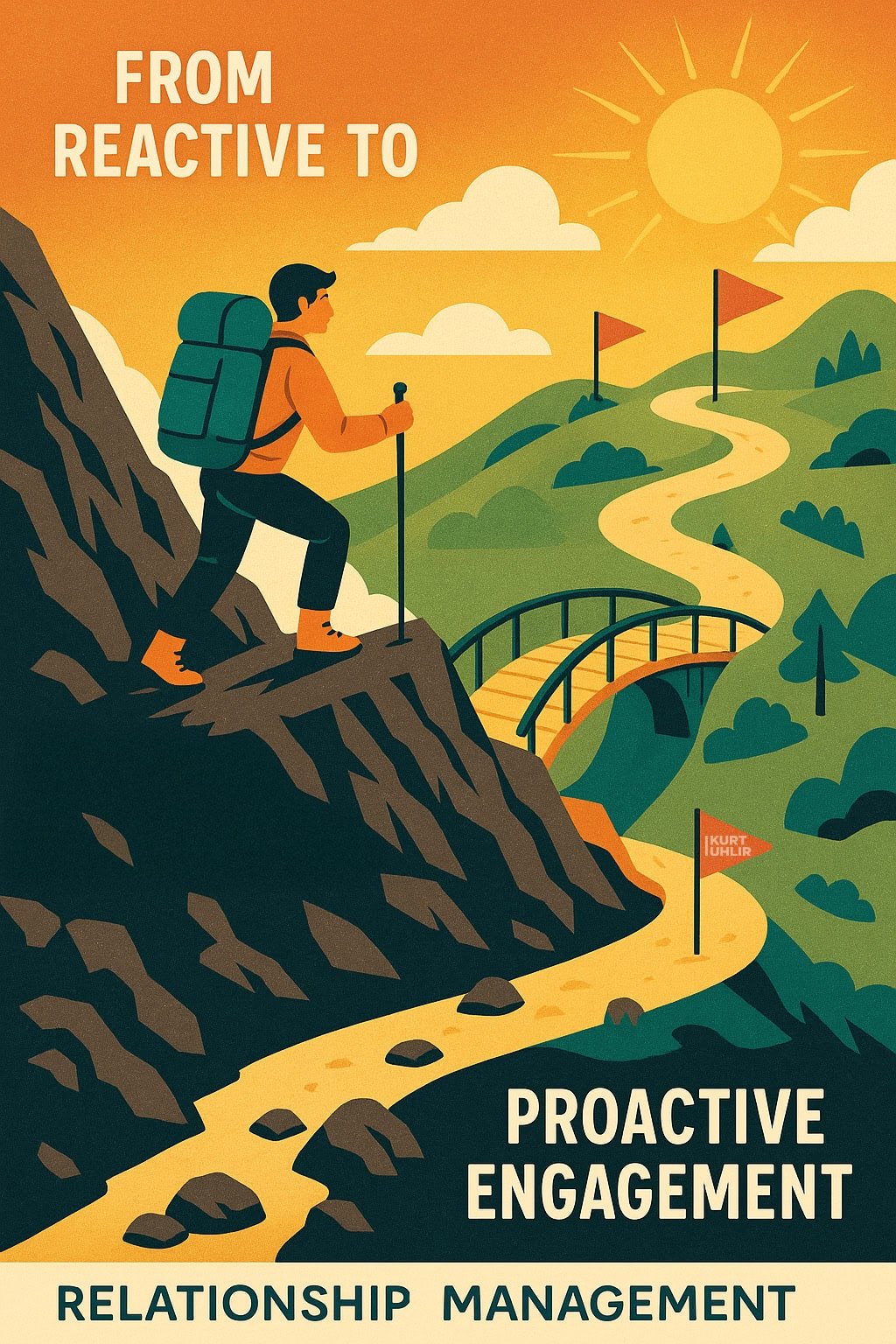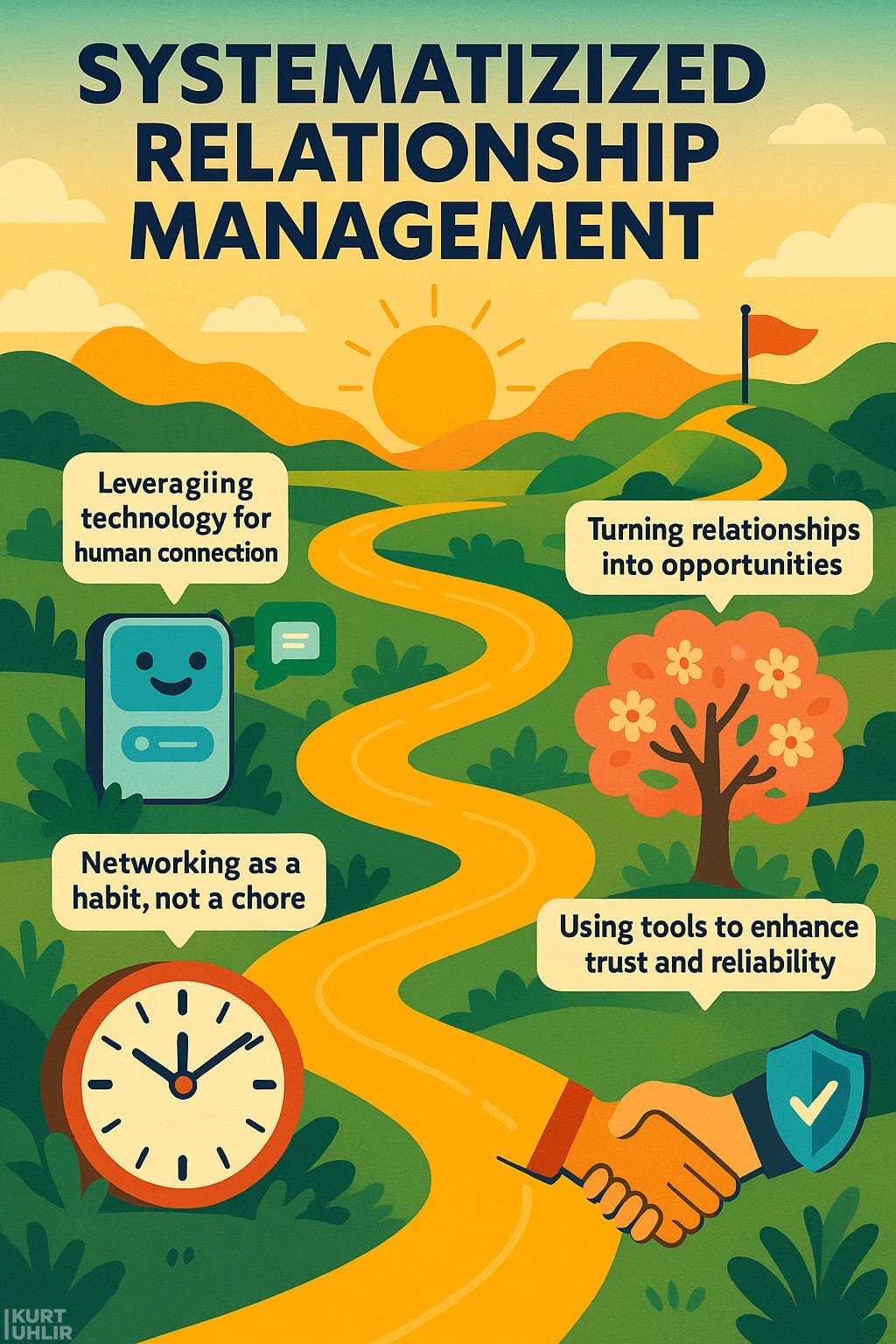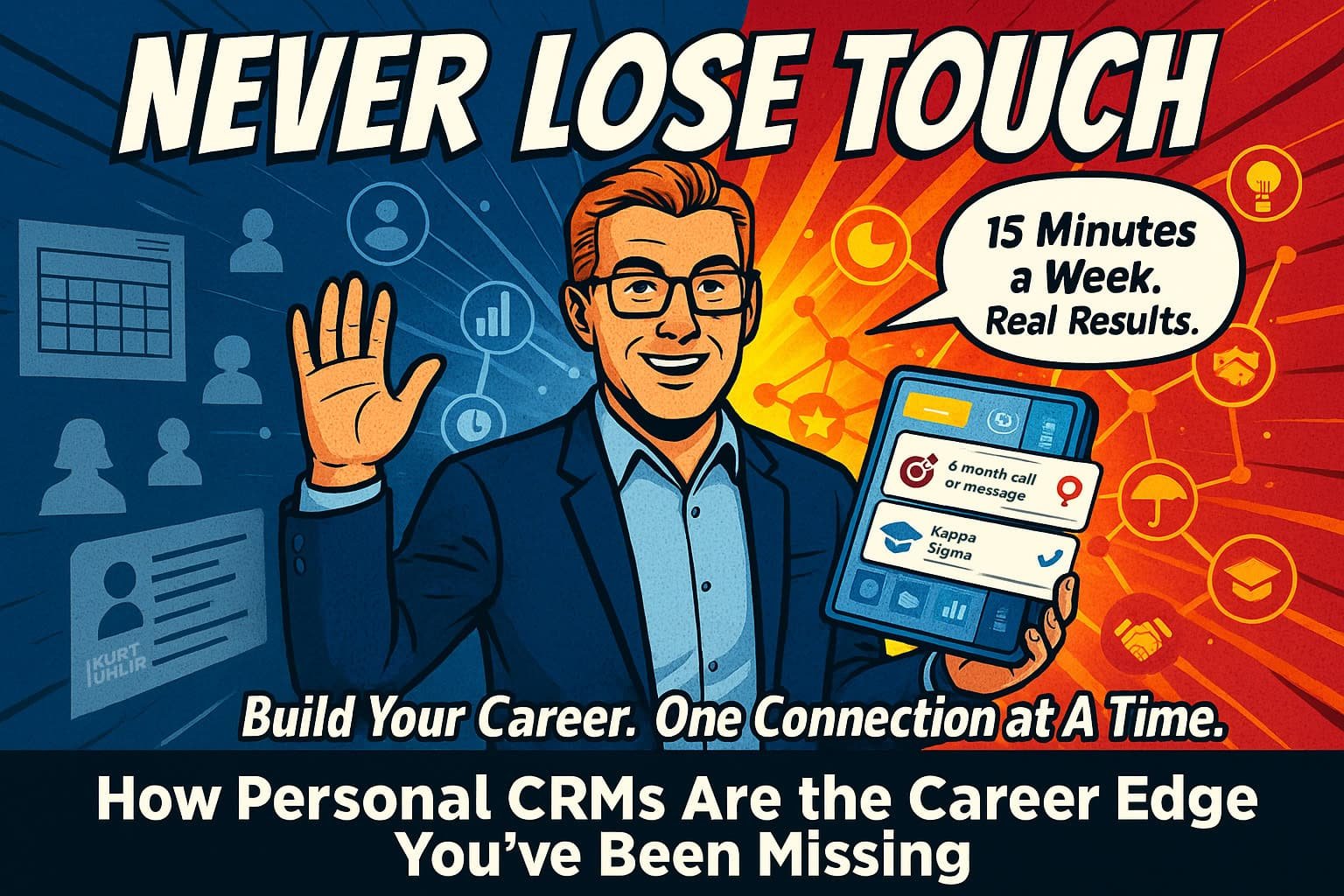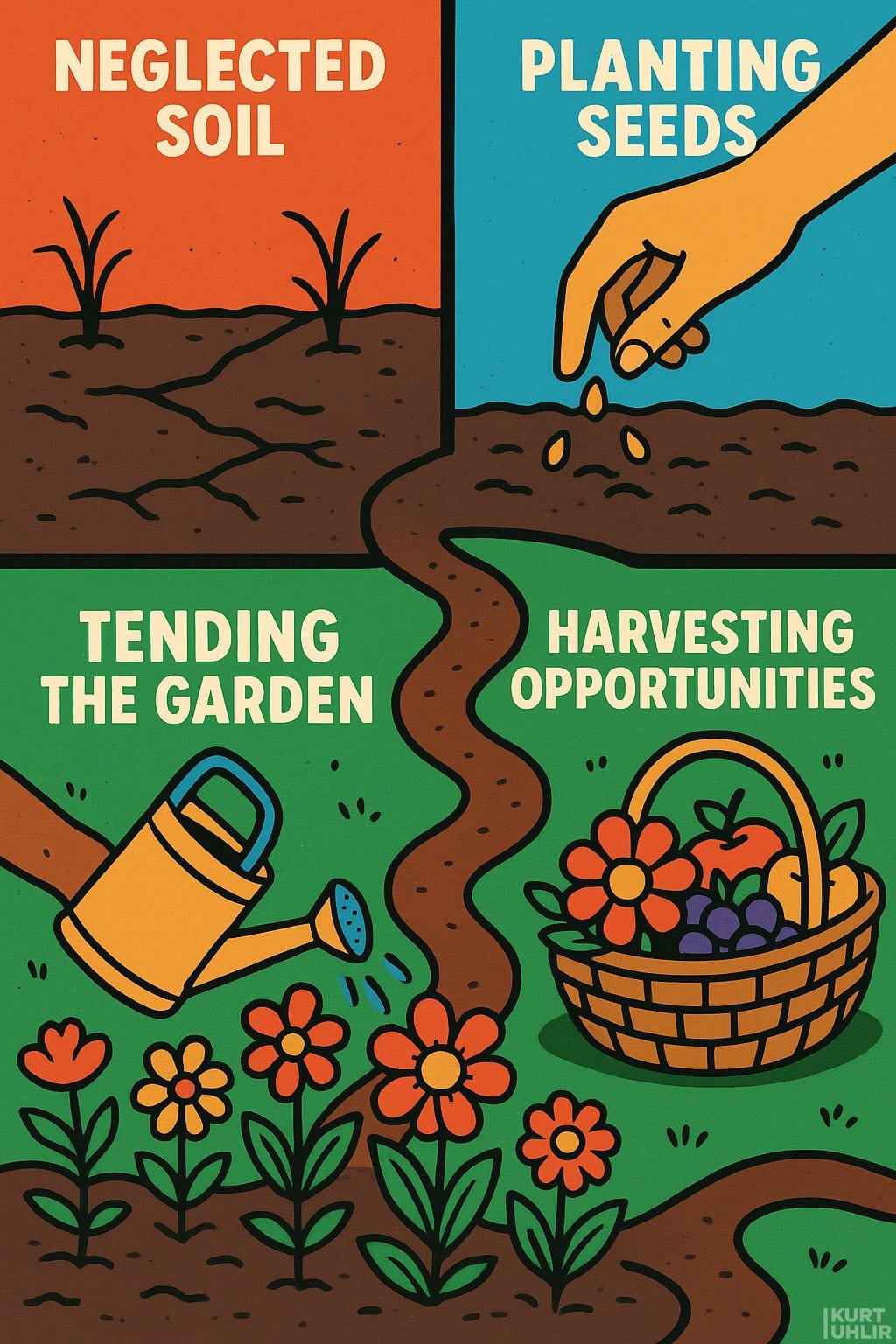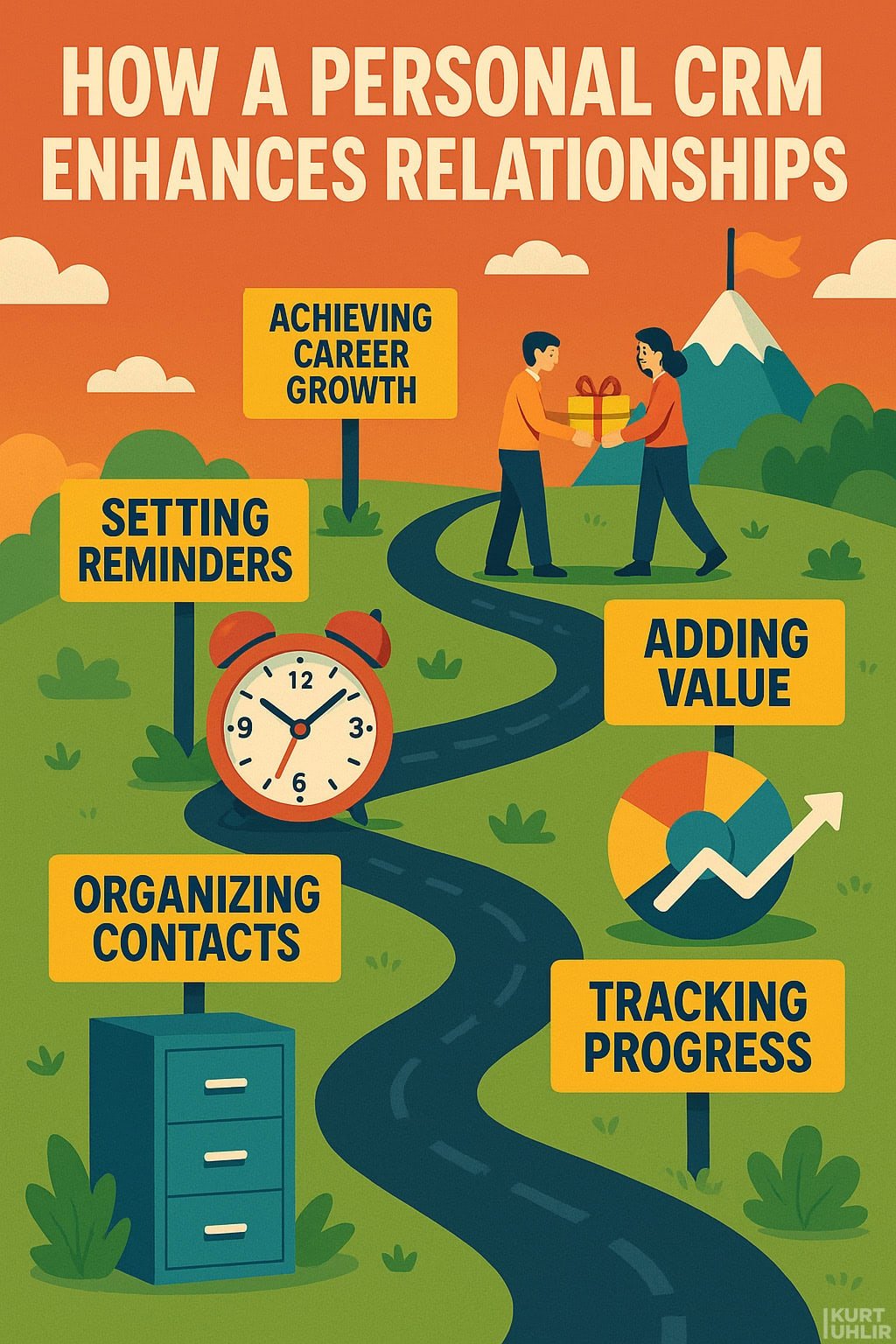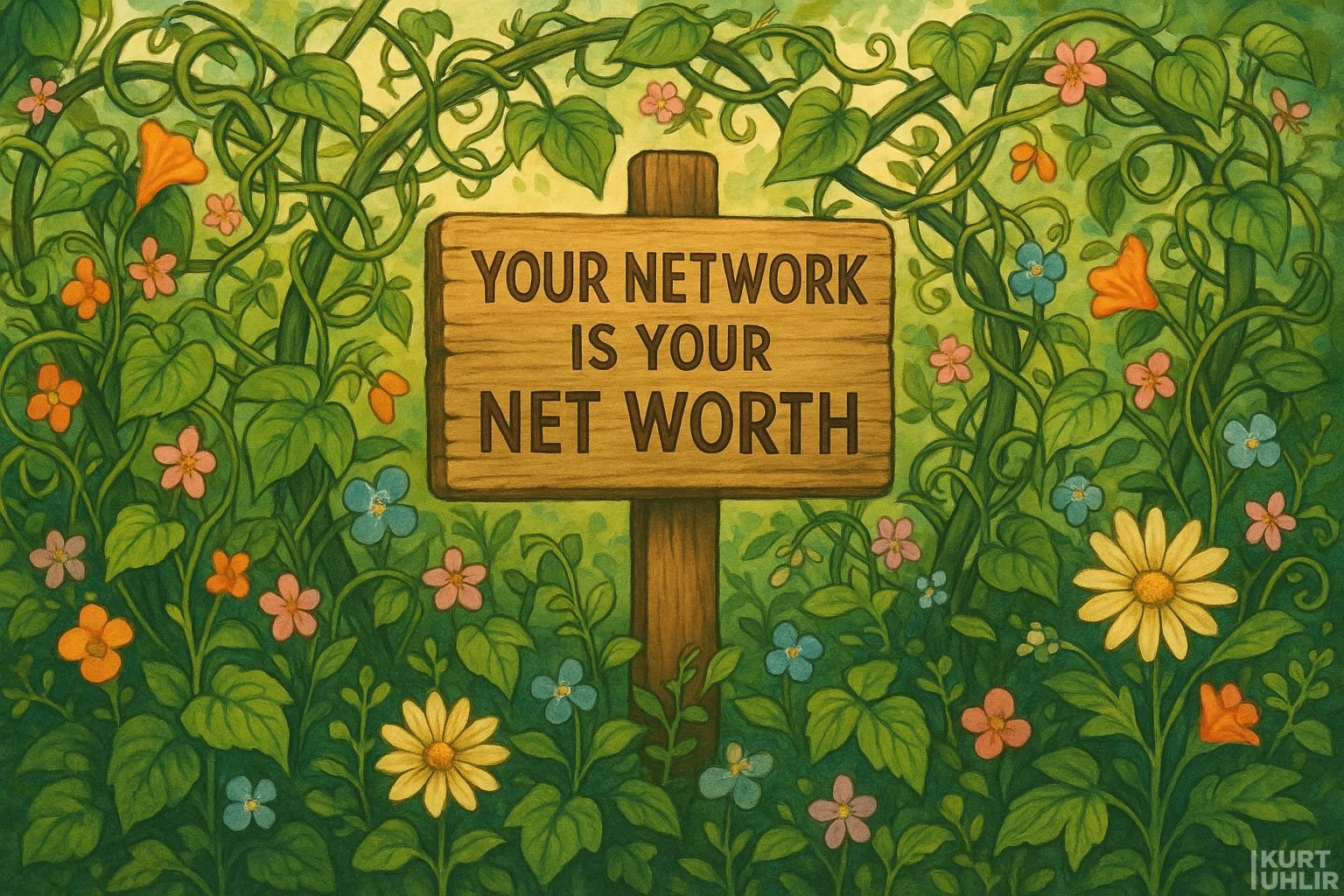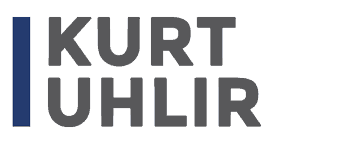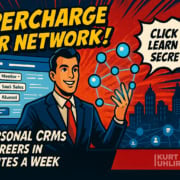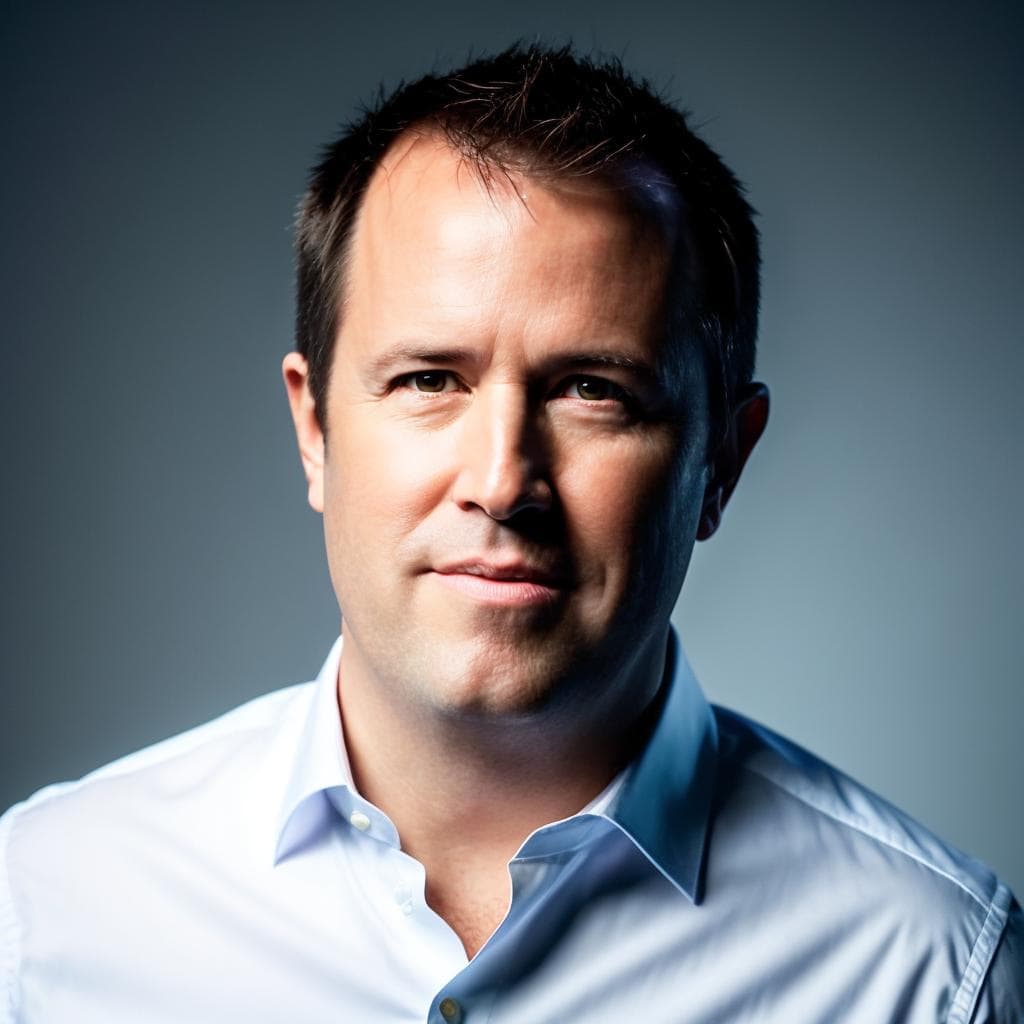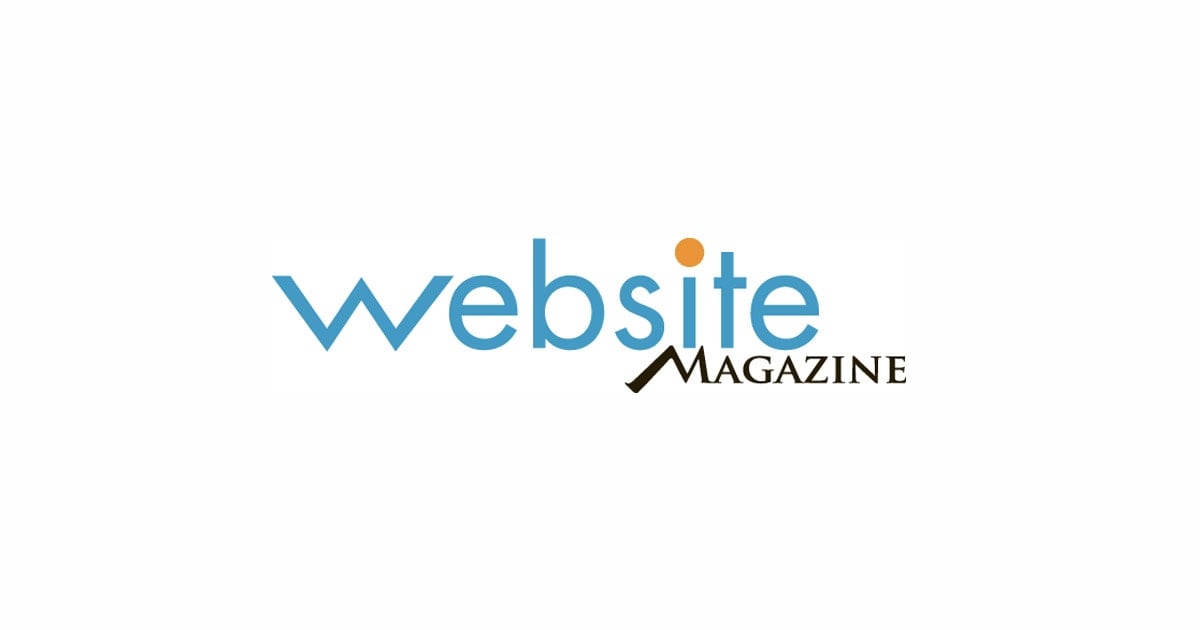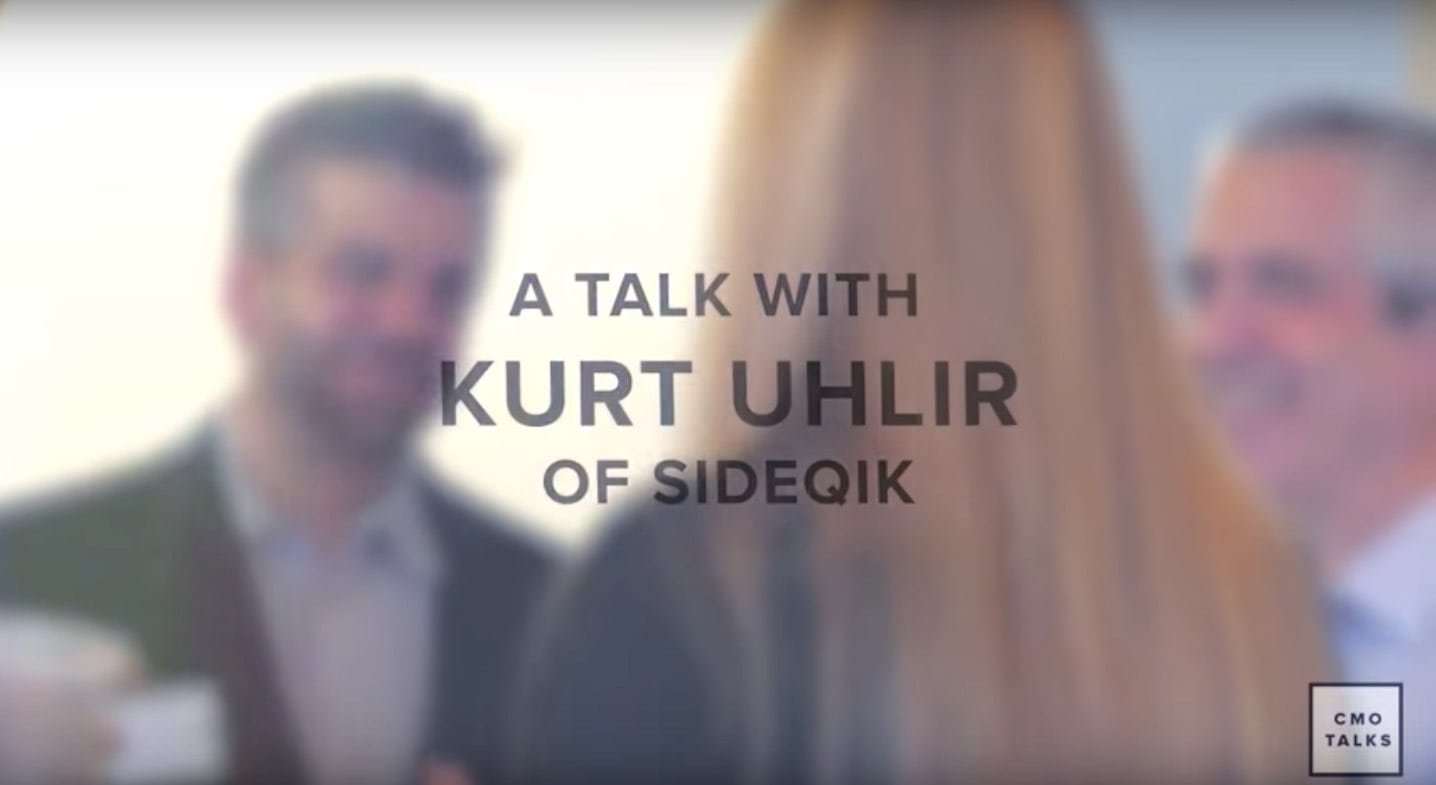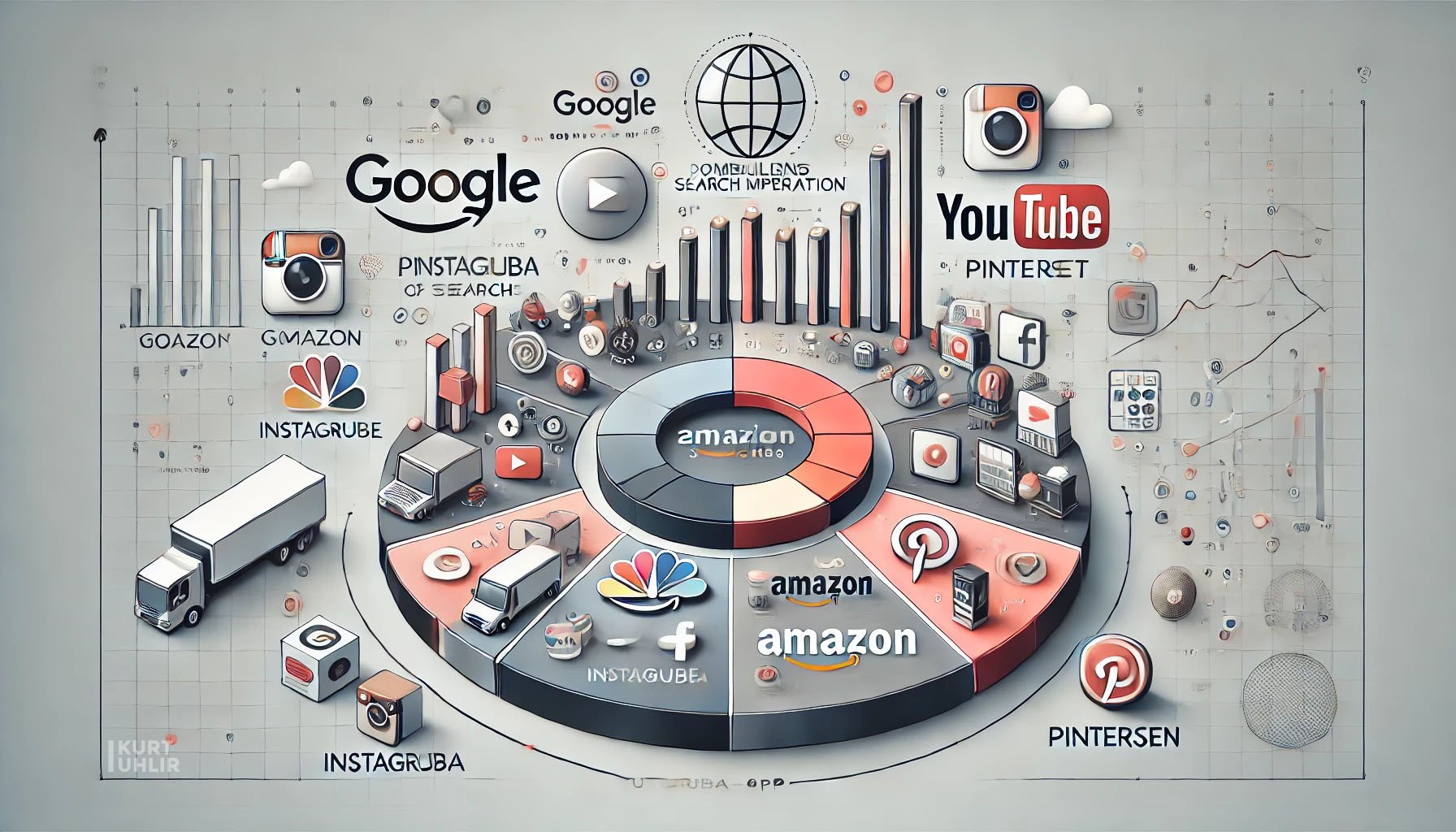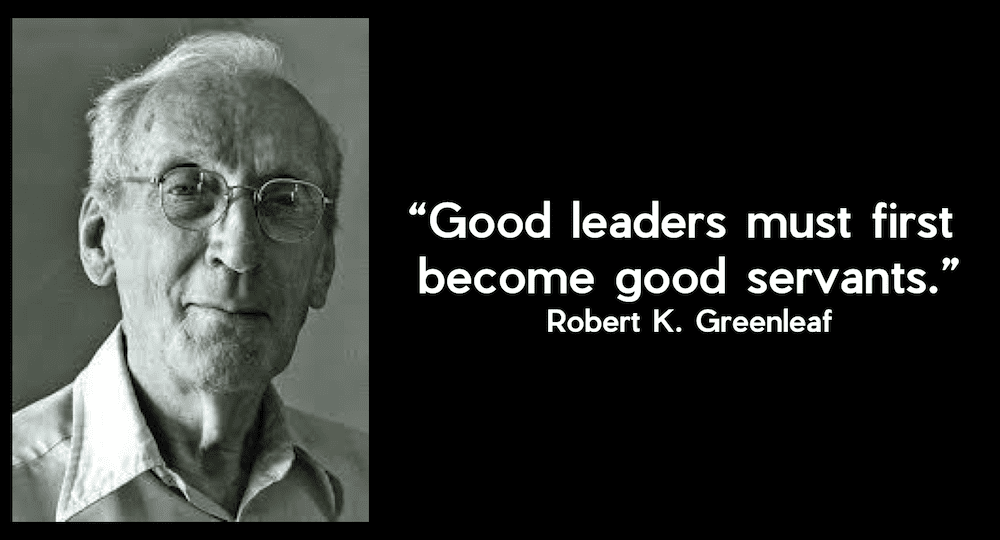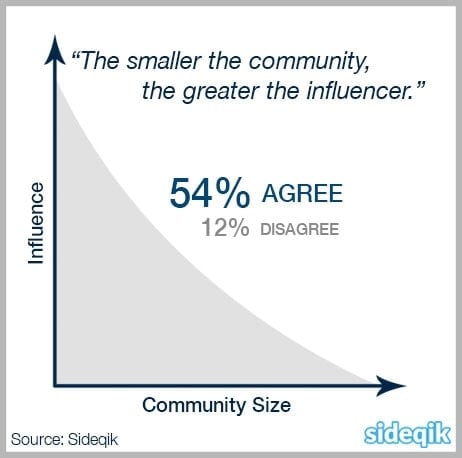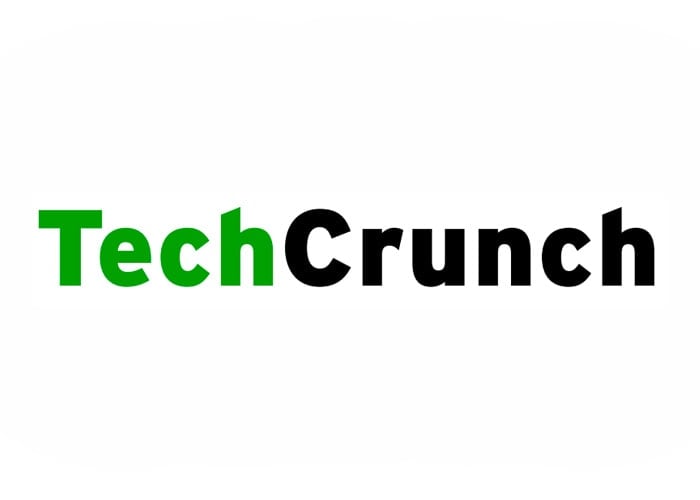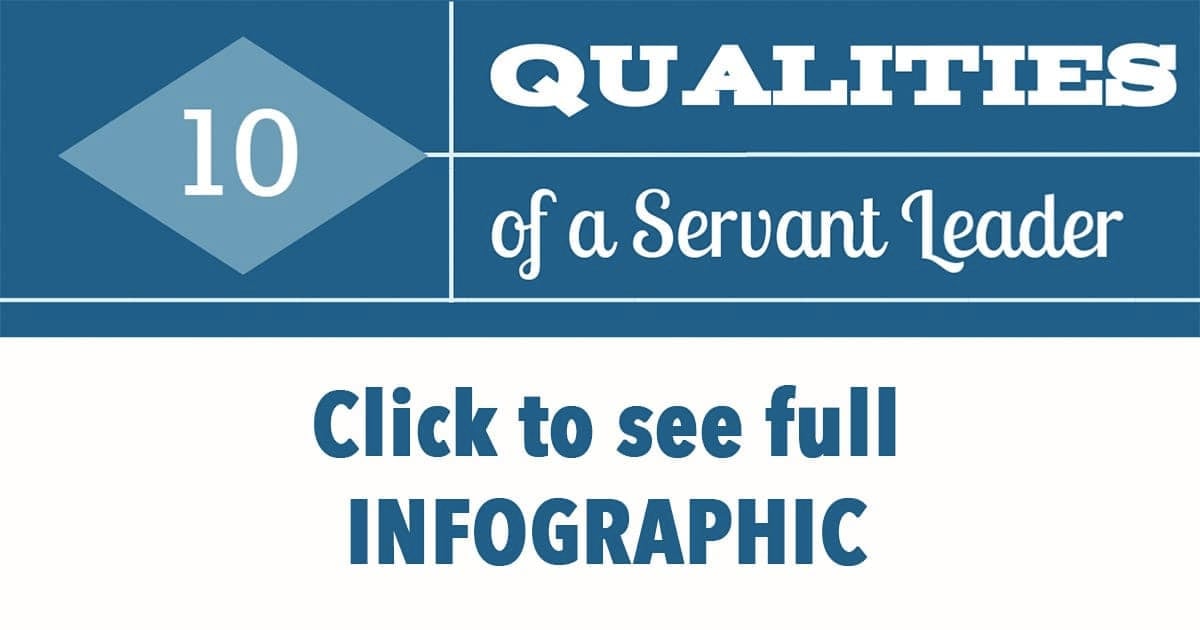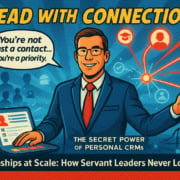Never Lose Touch: How Personal CRMs Can Supercharge Your Network and Career in Just 15 Minutes Per Week
Ever feel like you are starting from a standstill when you need to reach out to your network for something? Ever use the excuse that you just do not have enough time to “network” and stay in touch the way that you should?
I’m going to walk through how you can build your personal network in as little as 15 minutes every week and become the trusted resource in your community.
Table of contents
- Why Your Network Needs Nurturing (and Why We Fail to Do It)
- What is a Personal CRM (Personal Relationship Manager)?
- Choosing the Right Personal CRM: Key Features to Prioritize
- Nice-to-have features (not deal-breakers, but useful):
- Personal CRM Options: A Quick Comparison of Top Tools
- Making It a Habit: Best Practices for Using Your Personal CRM
- Personal CRM in Action: Case Studies
- The Future of Personal CRMs: High-Tech Help, Human Touch
- Looking for Your Next Role? Use Your CRM Differently.
- Your Next Steps: Build Your System, Build Your Future
Maintaining a strong professional network isn’t just a nice-to-have—it’s often the deciding factor in landing your next role or even hiring an incredible service provider.
In fact, a LinkedIn study found that an astounding 85% of jobs are filled via networking.
Yet far too many professionals let valuable connections wither due to busy schedules or lack of organization. We’ve all been there: you remember a former colleague only when you need a favor, or you struggle to recall a client’s spouse’s name even though you met last year.
The problem isn’t lack of goodwill; it’s lack of a system. This is where a Personal CRM (Customer Relationship Management) comes into play.
A Personal CRM is like an address book on steroids—a tool to systematically remember, refresh, and reinforce your relationships. It helps you stay in touch with people before you need something from them. Think of it as a unified source for all of your contacts, calendar, and journal combined, tailored for one-on-one relationship management rather than sales pipeline management.
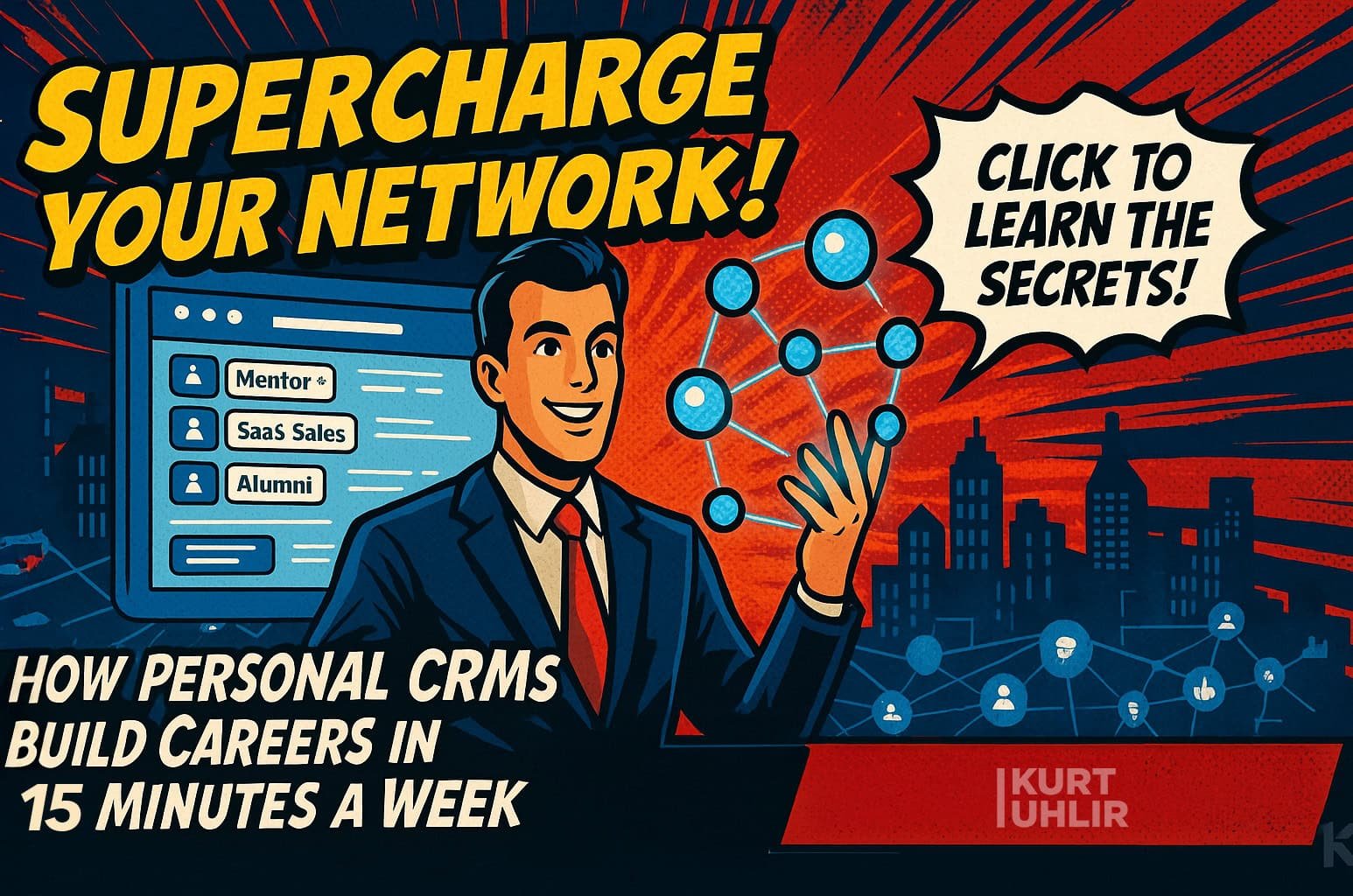
Why not just use a traditional sales CRM? Because roughly 90% of your professional network isn’t about immediate sales or deals + those tools are built for a different purpose. They are built to track and close deals, not build relationships.
Those college friends, former coworkers, mentors, industry peers, and community contacts won’t be in your company’s sales CRM, but they matter. A personal CRM gives those relationships a home.
You don’t have to be in sales to benefit – as one deep dive put it, personal CRMs focus on helping individuals (founders, consultants, executives, freelancers) stay organized and intentional with their contacts. In short, if you value your network, a personal CRM is your secret weapon to nurture it.
Before we dive into how to picking and using a personal CRM, let’s dispel a myth: networking doesn’t have to be daunting or sleazy.
When done right, it’s simply about genuine human connection over time.
We’ll explore the why, what, and how of personal CRMs—complete with key features to look for, best practices, case studies, and even how this ties into concepts like NetWeaving and servant leadership. By the end, you’ll see how adopting a personal CRM can transform your networking from a sporadic chore into a powerful habit (and competitive career advantage).
Let’s get started.
Why Your Network Needs Nurturing (and Why We Fail to Do It)
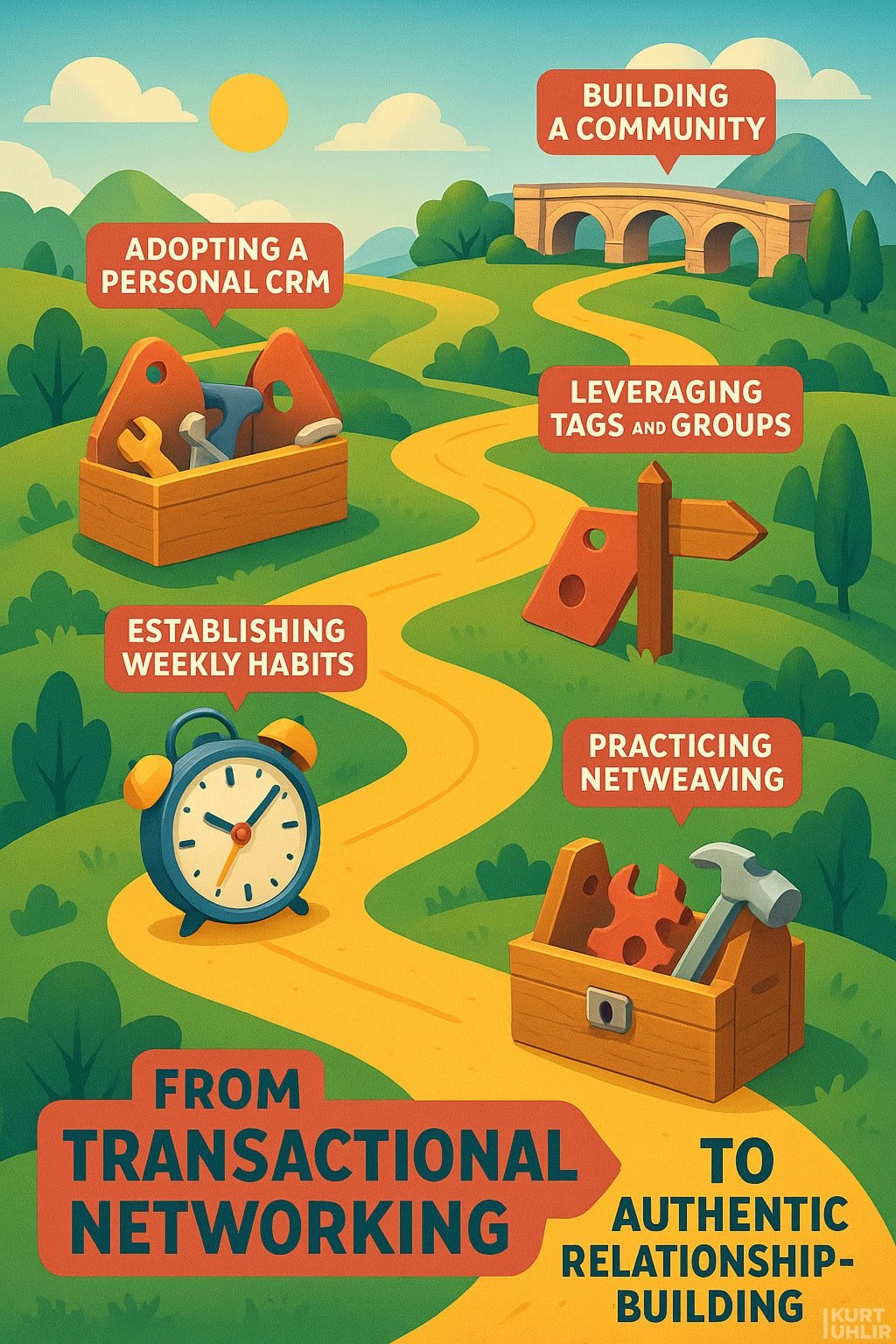
If 85% of opportunities come through networking, why do so many of us spend 0% of our week tending to our network? It usually boils down to three reasons:
- Out of sight, out of mind: Daily demands grab our attention. We intend to keep in touch with former colleagues, old clients, mentors, and friends, but weeks and months fly by. Without a system, important connections inevitably fade simply because we forget to reach out regularly.
- Networking feels “extra” or transactional: Many people admit they don’t network proactively because it feels awkward to call someone up without a specific reason. There’s a stigma that networking = asking for something. (We’ll later see how Netweaving flips this mindset.)
- We do not have the time: Without a system you trust, staying in touch with people 1) takes way more time than it should and 2) does not feel valuable as there is no way to know if you are doing it effectively, adding value to the people you know, or actually building relationships that could help you in the future.
The result? We neglect our network until a crisis hits or you need something—suddenly we’re job hunting or need an introduction, and we scramble to reconnect with people we haven’t spoken to in ages. Not only is this ineffective, it misses the true value of networking: being engaged consistently so that relationships are mutually beneficial over the long term.
Consider the stark contrast in job search outcomes:
People who rely only on online applications (the “spray and pray” method) often hit a wall. Online job applications have an average success rate of around 2%– essentially a shot in the dark.
Making matters worse, a huge portion of online listings aren’t even real openings. A 2024 recruiting survey found 81% of recruiters admitted their company posts “ghost jobs” (positions that are already filled or don’t actually exist). And data from hiring platforms shows that roughly 20% of all job postings are effectively phantom listings that never get filled. Some labor market analyses put the number even higher – more than one-third of postings may be fake or not actively being hired for. In other words, if you’re just scrolling job boards and hitting Apply, a good chunk of the time you’re chasing things that aren’t even real.
No wonder a candidate like Serena Dao sent out 260 applications with no offers, only to finally land a role through networking.
As another example, I have a friend that was an executive with a public company in the engineering space. His company was under a hiring freeze for all but critical replacements. Yet, upper management was having him spend 20%+ of his time interviewing candidates to build a portfolio of people in case things turned around for them. None of the openings he (and his colleages in other divisions) were interviewing people for actually existed or were approved for hiring. So not only did this waste the candidates time, he ended up leaving that company because it did not feel right.
The deck is stacked against the “apply online” approach.
Authentic networking flips that paradigm. By building relationships, you hear about roles before they’re posted (or that never get posted at all), and you earn referrals that skip you past resume gatekeepers.
As one career coach put it, “Authentic relationships are the bedrock of sustainable success…
“Your next opportunity rarely comes from a cold application. It comes from a conversation. Bulletproofing your career means building a system and a tribe—because job security today is about visibility, credibility, consistency AND connections.” —Pat Romboletti, Founder of Bulletproof Your Career…for LIFE™
The days of simply uploading résumés and hoping for the best are rapidly fading”.
In short, who you know often matters as much as what you know – and maintaining those relationships is the key.
So why do we fail to nurture our network?
It’s not due to lack of awareness; most of us know networking is important (if you didn’t, the stats above make it clear). The issue is lack of a habit and a system. This is exactly where a personal CRM shines. It provides a lightweight structure to make relationship-building a regular part of your routine, without feeling fake or opportunistic. Before we explore the tools and tactics, let’s clarify what a personal CRM actually is and how it works.
What is a Personal CRM (Personal Relationship Manager)?
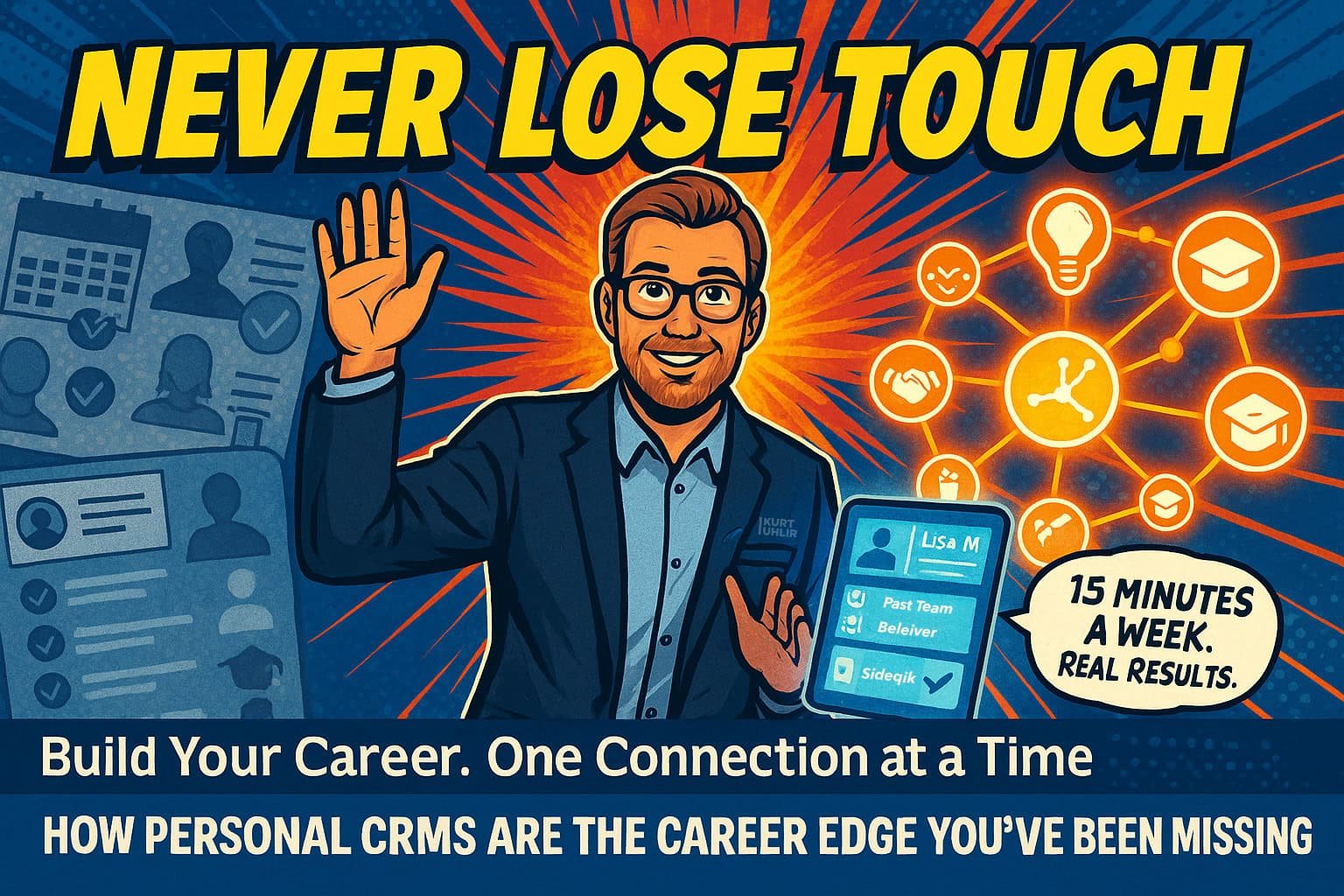
A Personal CRM is a tool designed to help individuals manage relationships in a deliberate, organized way – think of it as a relationship assistant that automatically knows who you’ve messaged, what is going on with them, and will gently remind you to follow up with people.
In the business world, companies use CRM software to track customers and sales leads. A personal CRM takes that concept and applies it to your contacts: friends, former coworkers, mentors, industry acquaintances, clients – essentially anyone in your personal and professional network.
How is a Personal CRM different from a normal (sales) CRM?
Traditional CRM systems (like Salesforce, HubSpot, etc.) are company-centric and deal-focused. They’re great for tracking prospects through a sales pipeline or managing customer support interactions. But they’re overkill (and often too rigid) for an individual wanting to keep in touch with hundreds (or thousands) of people where there’s no “deal” on the table.

If you’re not in a formal sales role, using a sales CRM can feel like fitting a square peg in a round hole – it forces your relationships into a sales funnel template.
Is there a pipeline (e.g. deal to close) for that coworker you worked with 5 years ago, that guy in your small group from church, or your college friend that lives across town?
Moreover, you typically shouldn’t dump your whole personal network into your work CRM; that’s neither practical nor appropriate.
A personal CRM is your private database and reminder system for maintaining relationships that aren’t about selling something right now. (Remember, ~99% of your entire network at any given time won’t be part of an active sales cycle, no matter what product you sell – but those people could be future colleagues, recommenders, friends, etc.)
Core idea: A personal CRM helps you remember details and follow-ups so you can treat everyone like a VIP. Ever bump into someone at a conference and struggle to recall what you last talked about? With a personal CRM, you could quickly glance at your notes and be ready to have a warm, informed conversation. It’s about context.
These tools let you log notes about each interaction (“Gabe mentioned he’s training for a marathon” or “Priya’s son was applying to college this fall”), set reminders (“follow up with Priya in November to ask how her son’s college apps went”), and get prompts when it’s been a while since you last spoke. In essence, the personal CRM becomes an external brain for your relationships. Increasingly, they will do this automatically as well without you actually having to take the notes. By offloading the cognitive load of remembering dozens of little facts and dates, you free yourself to engage more sincerely when you do reach out.
Key personal CRM features typically include:
- Contact Profiles: A consolidated view of each person – contact info, notes from past conversations, tags/groups, and activity history (calls, meetings, emails, etc.).
- Notes & History: The ability to jot down notes after a call or meeting. Over time, you accumulate a rich history (e.g., “March 2023: met at SXSW, discussed her new side hustle; July 2023: congratulated on product launch.”).
- Tags or Categories: Flexibly group people into categories (e.g., “Former coworkers”, “Mentors”, “Industry: FinTech”, “Personal friends”, “members at Northside Church”, “VIP clients”). Tags help in filtering contacts and remembering who is who.
- Follow-up Reminders: Perhaps the most important feature. You can set recurring reminders for each contact – for example, a prompt to ping a former client every 90 days just to check in, or a yearly reminder for a friend’s work anniversary. Good personal CRMs let you customize the frequency per person and will surface a reminder when it’s time.
- Calendar Integration: Many personal CRMs integrate with your email or calendar to log interactions automatically (e.g., it might note that you had a meeting or email exchange with X on a certain date). This lowers manual data entry and can trigger you to add a follow-up note.
- Mobile App: An easy-to-use mobile app is essential. You want to add notes or check info on the go (say, right after lunch with someone, or right before a chance encounter). A personal CRM should be accessible wherever you are, not just on a desktop.
- Privacy & Ownership: Unlike corporate CRMs where data is company property, a personal CRM is yours. Your relationships are an asset you carry through your career, so you want assurance that your data is secure and portable. Many personal CRM tools emphasize privacy controls and the ability to export your data.
- Lightweight Automation: Some tools use AI to enrich contact info (like pulling in a person’s latest LinkedIn update or news about their company) or to suggest who to reach out to. The idea isn’t to automate away the relationship (you can’t), but to give you helpful nudges. For example, Covve – a popular personal CRM app – scans news sources and will notify you if one of your contacts or their company is mentioned in the news, which creates a perfect excuse to touch base (“Hey, saw your team in the news – congrats on the funding!”.
- Business Card Scanning & Importing: Ever come home with a stack of business cards from a conference? Apps like Covve include a built-in business card scanner to import those new contacts effortlessly. Others sync with LinkedIn or your phone contacts to pull in details.
In short, a personal CRM combines contact management + note-taking + reminders in one. It’s less about sales funnel metrics and more about keeping relationships warm. Instead of contacts slipping through the cracks, you’ll get a gentle prod that “Hey, it’s been 4 months since you last chatted with Rachel”– prompting you to send a quick text or email. Those small actions, compounded over time, are what nurture a network.
A quick reality check: Will a personal CRM magically turn you into a master networker overnight? Of course not. It’s a tool, not a substitute for genuine interest and effort. You still have to do the reaching out. But the tool makes it way easier to stay organized and consistent. It helps you be thoughtful at scale – remembering birthdays, following up when you said you would, and reaching out before you or the other person have an “ask.” In other words, it helps you be the kind of networker we all want to be but struggle to be amidst life’s chaos.
Now that we know what a personal CRM does, let’s look at how to choose one that’s right for you and the key features to prioritize (some matter more than others).

Choosing the Right Personal CRM: Key Features to Prioritize
Not all personal CRMs are created equal. Some are simple apps focused on reminders, others are more like mini-CRM databases. The “best” choice depends on your workflow and what will actually stick for you. When evaluating your options, here are the essential features and why they matter:
- 🔖 Tagging & Search: The CRM should let you categorize and filter contacts easily. Being able to tag or group contacts (by how you know them, their industry, etc.) is extremely useful. For instance, you might want to quickly pull up all “Former Clients in SaaS” or “People I met at Conference X.” Make sure you can both tag and search notes easily, so nothing gets lost. Tagging is foundational to keeping your network organized in a way that makes sense to you.
- ⏰ Recurring Reminders: This is arguably the killer feature of personal CRMs. You want the ability to set a recurring follow-up interval for each person (or at least for priority contacts). For example, you might set a 30-day reminder for close mentors, 90 days for old colleagues you like to keep up with, and maybe 180 days for more distant connections. The app should then surface a “To Do” list each day or week of people who are due for a touch-base. Without automated reminders, you’d have to manually track timing — and you probably won’t. So, insist on recurring reminder functionality.
- 📱 Mobile Accessibility: The best personal CRM is the one you have with you. Since networking moments often happen on the fly (you bump into someone, or you’re waiting for a train and think “I should text Alex”), make sure the tool has a good mobile app (or at least mobile-friendly web app). You’ll want to jot a note immediately after a conversation, or quickly look up someone’s details on your phone. A clunky mobile experience = you won’t use it consistently.
- 🤝 Ease of Adding Contacts & Syncing: Look for tools that make it easy to get your existing contacts in and keep them updated. Many personal CRMs will sync with your Google or Outlook contacts, or let you import a CSV. Some have integrations with LinkedIn or your email to auto-capture new contacts you interact with. At minimum, the process of adding a new person (with name, company, etc.) should be quick and painless. If it takes 10 minutes of data entry every time you meet someone new, that’s a bad sign. Bonus points if the app can sync with social media or provide updates when a contact changes jobs (some do this).
- 🔒 Privacy Control: Because you’ll be storing personal notes (“John mentioned he’s looking for a new job” or “Sara’s mom is ill, be sure to ask next time”), you want to trust the app’s privacy. Check if the data is encrypted and if you can export/delete your data anytime. Avoid tools that might sell your contact info or insights. Most reputable personal CRMs are clear that your data is private to you and not used for AI training, but it’s worth double-checking.
- ✨ Simplicity and UX: Ultimately, the CRM should fit seamlessly into your life. A clean, intuitive interface matters more than having every bell and whistle. You’re not managing a thousand sales deals – you’re managing relationships. So look for a tool that feels light, friendly, and motivating to use. Some apps, like Clay or Dex, pride themselves on beautiful design and even add a bit of fun (like showing you relationship “streaks” or giving you a daily card of a person to reach out to). These little touches can actually make a difference in keeping you engaged.
- 📧 Email integration: Some personal CRMs can live inside Gmail/Outlook or at least link to your email, allowing you to log an email thread to a contact’s timeline or send a message from the app. Not essential, but it can save time.
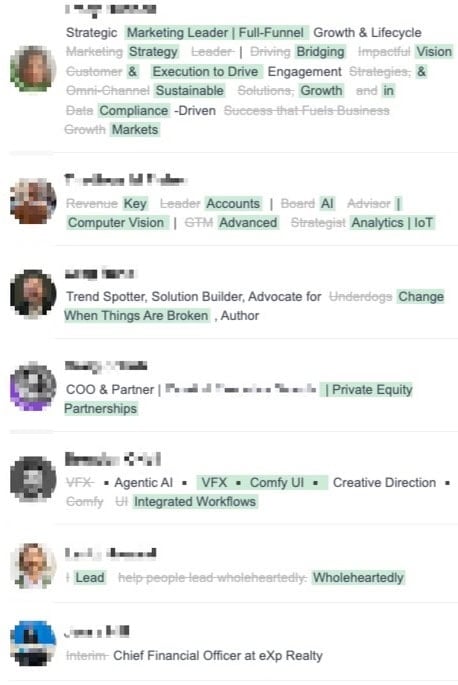
Nice-to-have features (not deal-breakers, but useful):
- 👥 Social media integration: A few tools pull in recent tweets or LinkedIn title changes from your contacts. This can provide conversation fodder (“Congrats on your post about X!”). Again, not required, but cool. Some will also pull in your direct messages and allow you to count those as a touch point with your contacts.
- 🤖 AI insights: Newer entrants are experimenting with AI that might draft a message for you or highlight key things from someone’s LinkedIn bio. Treat these as experimental – potentially handy, but don’t choose a CRM solely for the AI hype. The real value is in your notes and consistency.
- 🔁 Multi-platform support: If you use multiple devices (Windows PC at work, Mac at home, Android phone, etc.), ensure the CRM is available on all or has a good web app. Consistency across devices will help you maintain the habit anywhere.
- 💲Price: Many personal CRMs are freemium – they offer a free tier with limits (e.g., max 100 contacts or limited features) and a premium tier for power users. We’ll talk about specific pricing in the comparison table next. But generally, expect to pay anywhere from $0 up to ~$20/month for the most feature-rich options. There are also one-time purchase apps if you prefer that model. Free is great to start, but don’t shy away from paying for a tool if it demonstrably makes you more effective in networking (think of it as a career investment).
To recap: tagging, reminders, mobile app – these are must-haves. If those three are solid, you’re off to a good start.
Now, which personal CRM should you actually use? Let’s compare a few of the leading options and see how they stack up.
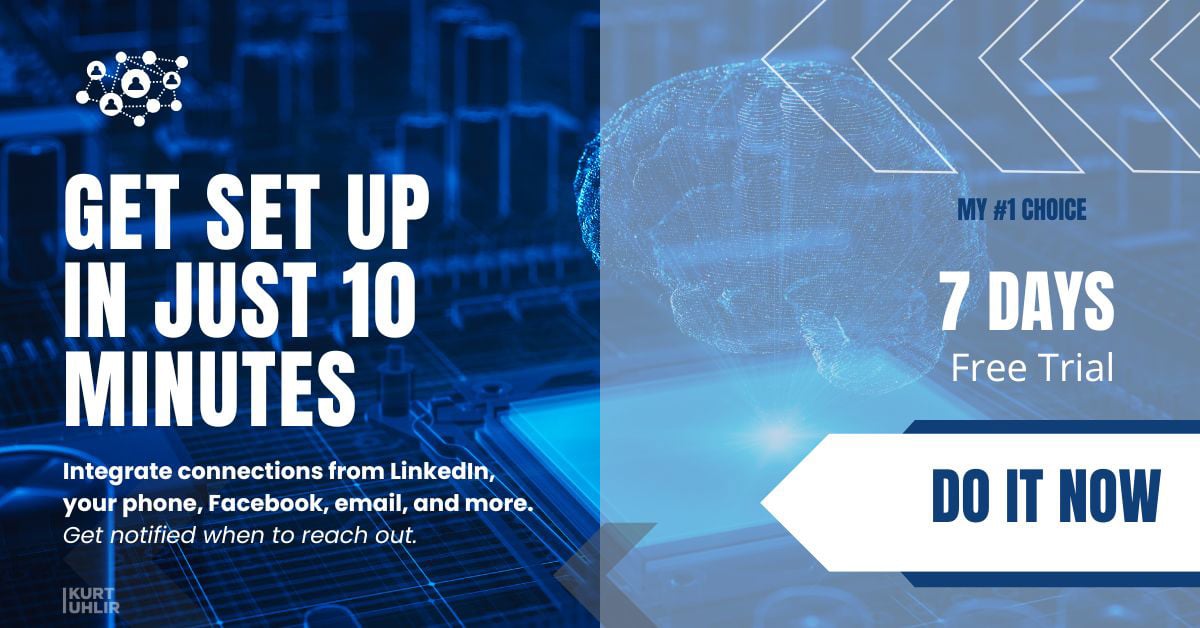
Personal CRM Options: A Quick Comparison of Top Tools
There’s been an explosion of personal CRM tools in recent years. We can’t cover every app out there, but here’s a comparison of some popular ones that have garnered positive reviews. This will give you a feel for what’s available and help you narrow your shortlist.
| Personal CRM | Overview | Key Features | Pricing |
| Dex | A personal CRM built specifically for networking. Great for integrating with LinkedIn and your calendar. | Automatic logging of interactions (syncs with email/cal), customizable reminders, tags, mobile app. Also offers a LinkedIn extension to pull in profile details. | 7-day free trial; Pro ~$12/mo (billed $144/yr) for full features. |
| Clay | A sleek, AI-powered personal CRM with a beautiful interface. | Rich profile view that aggregates social updates, AI insights (summaries of contacts), smart reminders, and a gorgeous mobile and desktop app. Clay auto- enriches contact info from email signatures and LinkedIn. | Starts around $20/mo or $120/yr. There is a free plan for up to 1k contacts, but if you sync with almost anything, even if you do not want to stay in touch with anyone, that will force you out of the free plan. |
| Covve | Mobile-first networking app labeled as a personal CRM, but not really one in my opinion. Excellent for contact enrichment. | Smart auto-reminders, a digital business card scanner, and news alerts about your contacts (scans 150+ news sources) 10 . | Free tier (manage up to 20 contacts); Pro ~$9.99/mo (unlimited contacts, weekly reminders, unlimited card scans). |
| Monica | An open-source personal CRM that you can even self-host. Focused on personal relationships. | Robust note-taking and detail tracking (birthdays, how you met, family members’ names, etc.). Has reminders and tagging. Lacks fancy integration, but very private and customizable. | Free if self-hosted; or around $9/mo for hosted version. |
| UpHabit | A straightforward personal CRM for daily relationship management. | Custom reminders, notes, tags, and a clean mobile interface. Integrates with Google Contacts. Aimed at simplicity. | Free tier available; Premium ~$7.99/mo. |
| HubSpot (Free CRM) | Not a personal CRM per se, but the free version of HubSpot can be repurposed for personal use. | Full-featured CRM (contacts, companies, deals, tasks). You can create a “personal network” pipeline or use the task feature for follow- ups. Good if you want a robust system for, say, an active job hunt. However, it’s designed for sales, so it may feel heavy for casual use. | Free (with unlimited contacts). Paid upgrades available (not needed for basic contact management). |
Note: The above is a snapshot. New apps pop up frequently, and existing ones add features. Some people even bend general tools (like Notion, Airtable, or Trello) into a DIY personal CRM. For instance, you can find Notion templates that mimic CRM functionality. If you love customizing and don’t mind manual setup, a DIY approach in Notion or a spreadsheet is viable. The downside is you won’t get the handy integrations and automated reminders that dedicated personal CRM software provides.
For most folks, I’d recommend starting with a purpose-built personal CRM app – you can always export your data later if you outgrow it. Many of these tools offer free trials or free basic plans, so test drive a couple and see which interface clicks for you. The best tool is the one you’ll actually use consistently.
My preference is Dex. I technically have a Clay account thanks to a lifetime license but the cap on contacts is too limiting on that account for it to be useful, and the founder of Dex, Kevin, appears to care more about helping people build meaningful relationships.
By now, you might be thinking, “Alright, I see the value and I’ve got some tool options… but how do I actually use a personal CRM day-to-day without it becoming a chore?” Great question. Let’s talk best practices and how to integrate personal CRM habits into your busy life.
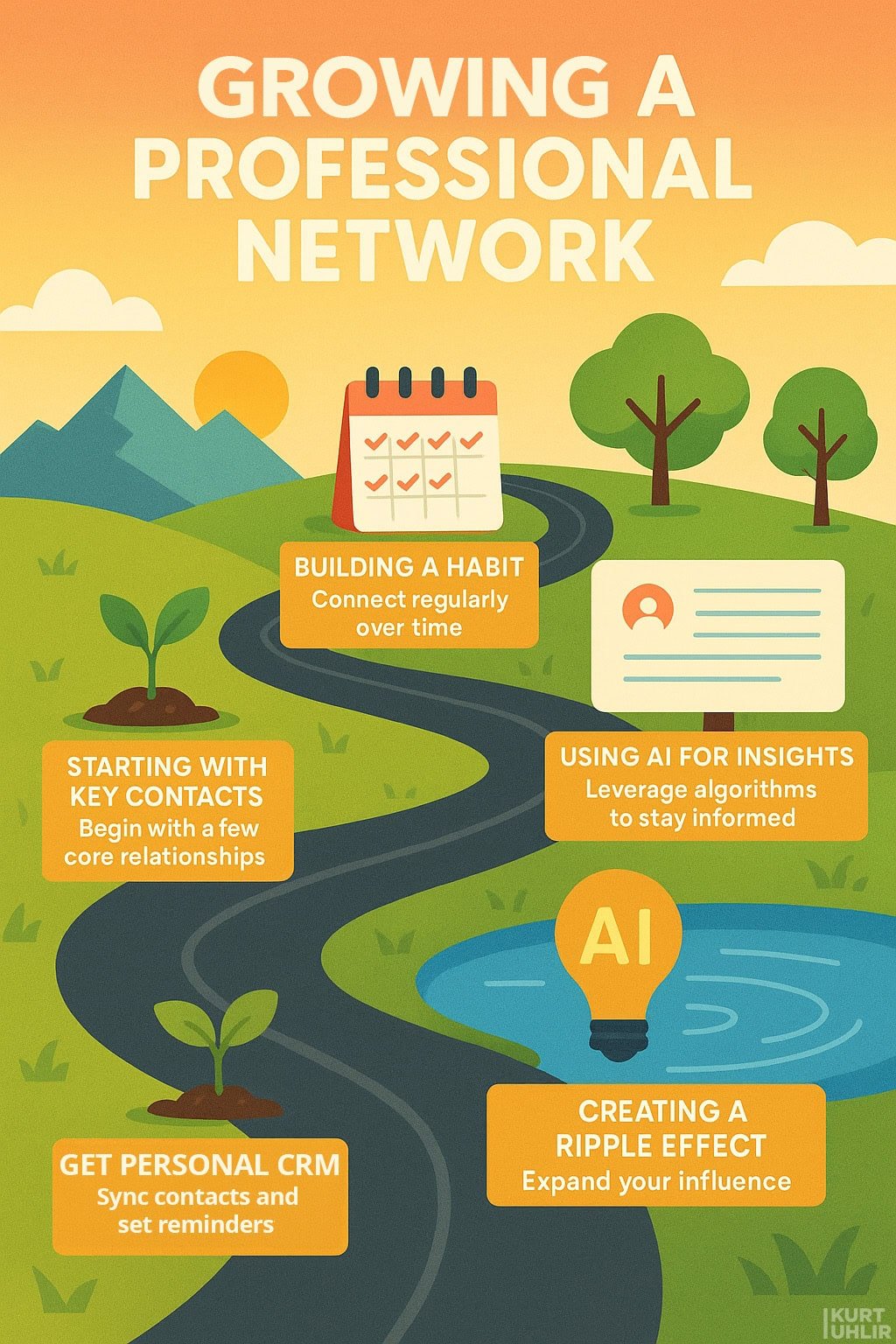
Making It a Habit: Best Practices for Using Your Personal CRM
- Start with your “critical few” contacts: When you first set up your personal CRM, don’t feel obligated to input every single person you’ve ever met right away. If you have thousands of contacts, you will never have everyone categorized and that is OK. Begin with the 20-30 people who matter most to you professionally (or personally). These could be former bosses, close colleagues, top clients, mentors, etc. You can gradually add more over time. The critical thing is to get going with a manageable list and not get overwhelmed. Add those key contacts, fill in whatever notes you readily recall about recent interactions, and set reasonable reminder frequencies for each (e.g., 30, 60, or 90 days depending on the relationship).
- Establish a weekly review routine: Consistency is king. Dedicate a small block of time each week (even 15 minutes) to review your personal CRM. Many users do this on a Friday afternoon or Monday morning. During this review, check who’s due for a touch-base in the coming week. Most personal CRMs will have a dashboard or “Stay in Touch” list that automatically shows contacts overdue or coming up. Decide how you’ll reach out – maybe you’ll schedule a coffee with one person, send a “congrats on that big project” LinkedIn message to another, and simply drop a “how’s it going?” text to a third. Treat it almost like a game or a self- challenge: each week you have a small list of relationships to tend. Over time, you’ll find this becomes a natural rhythm, and that list never gets too long at once if you’ve staggered the reminders sanely.
- Log interactions ASAP, but keep it light: After you have a call or meeting with someone, get in the habit of jotting a quick note in the CRM that day. It can be super brief – even a couple of bullets like “Discussed their Q4 goals; mentioned planning a trip to Spain next summer.” Fresh details are gold for future conversations (“Hey, how was that Spain trip?”). If you wait days or weeks, you’ll forget the subtleties. The good news is, writing these notes actually helps you process and remember the conversation too. However, don’t go overboard writing a novel – you’re not recording minutes for a legal deposition, you’re just leaving future-you some breadcrumbs. A good note is specific enough to be meaningful (“just ran Boston Marathon in April”) but not so verbose that you’ll never read it later. Find the balance that works for you.
- Use tags and groups meaningfully: As you add more contacts over months and years, tagging becomes powerful. Establish a tagging scheme early and stay consistent. For example, you might tag by how you know someone (“College”, “Work: [CompanyName]”, “Industry: Marketing”, “Investor”, “Mentor”, “Family Friend”). This lets you later pull lists like “everyone from my last company” or “all investors I know”. You can also tag interests or commonalities (“ Marathon runners” or “ Bangalore Office”). It’s fun and useful to recall connections (“Oh, I have 3 friends who are into ultra-running – maybe I should introduce them to each other!”). One caution: don’t create 50 tags you never reuse. Start with broad categories and refine as needed.
- Leverage reminders as prompts, not obligations: If your CRM nudges you that it’s been 90 days since you spoke to Alice, that doesn’t oblige you to force an interaction today. It’s a prompt to consider if reaching out makes sense. Maybe you know Alice is slammed this month, so you snooze the reminder to next month. Or maybe you drop a quick note just saying “Hey, saw a news article about your company and thought of you – hope you’re doing great!” The key is not to become a slave to the reminders. They are there to serve you, not create anxiety. Adjust intervals or skip check-ins as appropriate, especially if there’s nothing relevant to say. The goal is to maintain a genuine rapport, not to ping people on a robotic schedule.
- Be personal and add value when reaching out: When you do contact someone as a result of a reminder, make it count. Reference something specific – perhaps something from your last conversation or a recent event in their life or work. Example: “Hi Tom! Realized it’s been a while – last time we spoke you were about to start that MBA program. How’s it going so far?” This shows it’s not a generic check-in; you actually remember their context. If you can add value, even better. This could be as simple as sending an article related to their industry or congratulating them on a recent accomplishment you saw on LinkedIn. Or it could be offering an introduction: “By the way, I recall you mentioned looking for a good UX designer. I happen to know someone open to new opportunities – happy to e-introduce if you’re interested.” These netweaving touches (helping others without immediate benefit to you) deepen relationships. We’ll talk more about netweaving in a moment, but suffice it to say, if you consistently reach out in a thoughtful, helpful way, people will be glad to hear from you – and your networking will never feel slimy.
- Adjust as life changes: Your personal CRM is a living system. Feel free to update reminder frequencies and priorities as relationships evolve. Maybe you start a new job and suddenly you have 10 new colleagues – you might tag them and set a reminder to check in with each during your first 60 days. Or maybe an old friend becomes your roommate – you might take them off the “reminder” list entirely because you now see them daily (don’t worry about logging those interactions ). The tool should bend to your needs. Periodically (perhaps every few months), take a higher-level look: Are there people you’re “over-reminding” yourself about needlessly? Are there important folks you haven’t added yet? Do a little cleanup and tweaking. It’s like tending a garden.
By following these practices, you’ll integrate the personal CRM into your workflow in a sustainable way. Many users report that after 6+ months, their CRM essentially becomes second nature – they don’t have to remember to network, the system organically prompts them and they act on it. And because each interaction is logged, you build momentum. Networking feels less like random schmoozing and more like maintaining a valuable web of genuine connections, which it truly is.
Next, we’ll explore two powerful mindsets that turbocharge the effectiveness of using a personal CRM: Netweaving (the art of generous networking) and Servant Leadership applied to your relationships. These philosophies will ensure your networking doesn’t just serve you, but creates a positive impact for others – which in turn comes back around to benefit you even more.
Personal CRM in Action: Case Studies
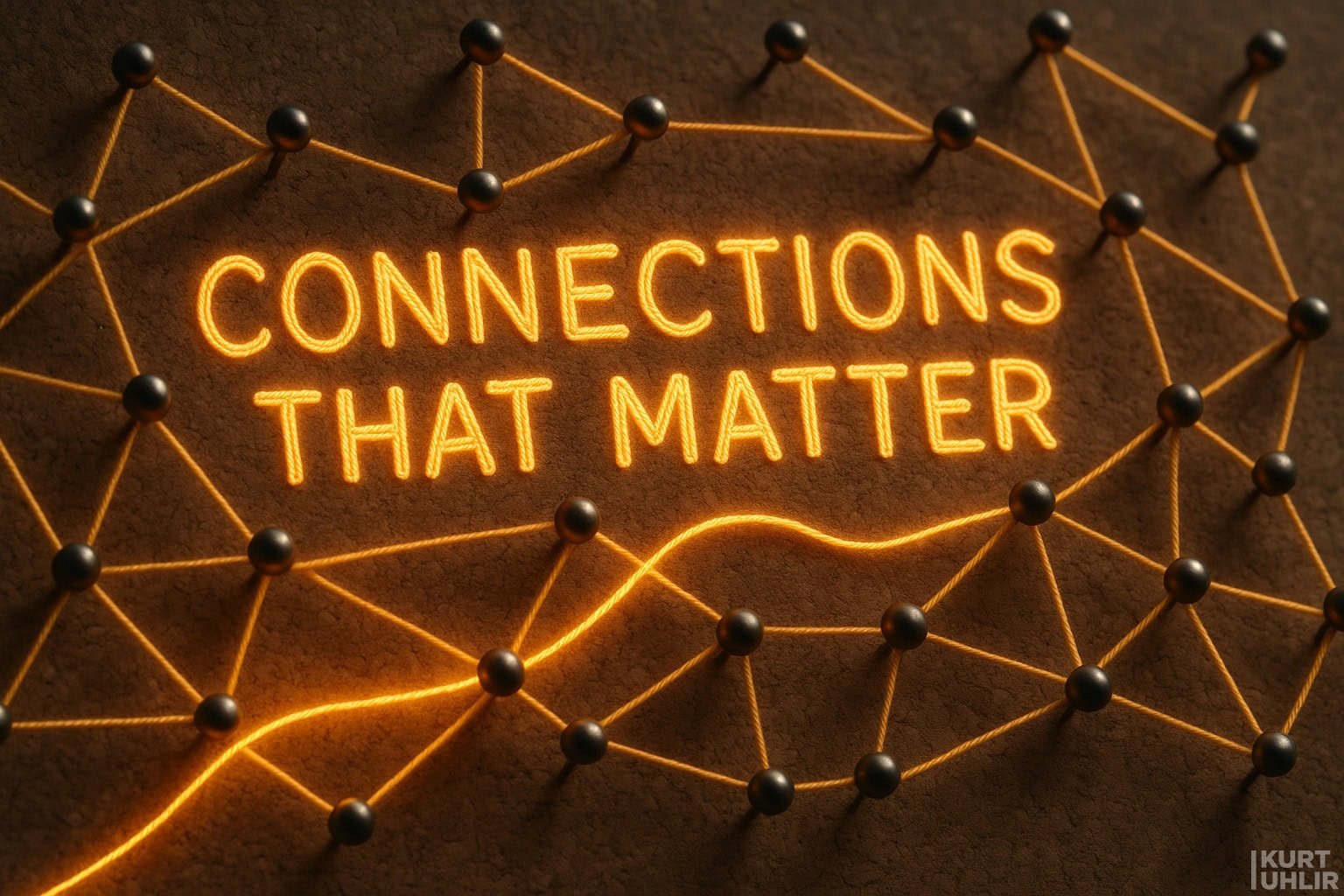
To make this all a bit more concrete, let’s look at two short real-life-inspired examples of how individuals have used personal CRMs to up their networking game:
Case Study 1: The SaaS Sales Professional (Turning Networking into Netweaving)
Meet Jane, a senior account executive at a SaaS company. Her job naturally involves a lot of networking, but she always found the typical sales networking to be somewhat superficial – collect business cards at conferences, follow up when you need to hit a quota, etc. After discovering the concept of personal CRM, Jane decided to use it in a netweaving spirit (helping others first). She imported her key contacts into Dex (her tool of choice) – not just clients and prospects, but former colleagues, partners, even friendly competitors. She tagged people by things like “ SaaS sales”, “🎓 College alum”, and “ Product marketing experts”. More importantly, in her notes she started recording one critical piece of data for each person: “What could I do to help this person?” For one contact, it might be that they’re looking for a job. For another, that they’re interested in learning about SEO. For yet another, that they’re new in town and looking to make local friends.
Armed with these notes and Dex’s reminders, Jane transformed her outreach. Each week when her CRM nudged her to touch base with a few folks, she looked at those “How to help” notes. Over a few months, she did things like: introduce a job-seeking friend to a hiring manager in her network; send a podcast recommendation to a client who wanted to learn Generative Engine Optimization; invite a newcomer in her city to a local tech meetup. Jane wasn’t asking for anything – she was giving. This is classic netweaving behavior (more on that in the next section). What happened next? The reciprocity came back naturally. People remembered Jane as a connector and helper. When one of her tagged “Product marketing expert” contacts heard of a company that needed a sales tool, he referred them to Jane’s company – generating a surprise sales opportunity for her. Another contact she helped ended up introducing her to a decision-maker at a dream account. In less than a year, Jane’s sales numbers jumped, but perhaps more gratifying – her relationships felt richer. “Networking” no longer felt dirty; it was about creating a rising tide for her circle. The personal CRM was the engine making sure no goodwill opportunity fell through the cracks. Jane often says that without the systematic reminders, she simply wouldn’t have remembered all those little promises to connect or help others. The tool made her look impressively on top of things (“You always remember exactly what I’m interested in – how do you do that?!” one colleague marveled). The answer: a few seconds of note-taking and a generous mindset, amplified by technology.
Case Study 2: The Executive CMO (Servant Leadership with a CRM)
Meet Mark, a Chief Marketing Officer at a mid-sized PE-backed tech firm. Mark leads a team of 30 and has mentored dozens of people over his career. He’s the kind of leader who takes a long-term interest in his people’s growth, well beyond the job. As his network expanded, Mark struggled to keep track of each person’s aspirations. He never wanted to be in a situation where a former employee reaches out and he blanks on their backstory. So Mark adopted a personal CRM (he uses Clay) primarily as a servant leadership tool. In each person’s profile – whether a direct report, a past team member, or a junior colleague he once mentored – Mark records notes about their goals and life events. For example: “Alex (product manager on my team) ultimately wants to start his own company,” or “Tina (who worked for me in 2015) moved to Denver and is passionate about edtech for homeschooling.” He also notes personal details if they come up naturally: “Married in 2019, spouse’s name Sam,” “Has two kids, Emily and Raj,” “Loves mountain biking.”
How does he use this? Mark sets long-term reminders, like an annual check-in for former team members. When one of those pings comes due, he’ll glance at his notes first. This prep allows him to send a thoughtful message – e.g., “Hey Tina, it’s been a year already since you moved to Denver – how’s the Colorado life treating you? Last we spoke, you were diving into the edtech sector. I actually just met someone running a startup in that space; if you’re interested I’d be happy to connect you two. Also, how’s your dog Cooper doing? ” For current team members, Mark uses his CRM before one-on-ones or performance reviews. He refreshes himself on what each person’s beyond-the-job ambitions are (which he always makes a point to ask and note down). “I remember you told me your goal is to transition into a product role in a couple years – let’s talk about projects here that can build relevant experience for you.” His employees are often pleasantly surprised that he not only remembers their goals but actively tries to support them.
Over a decade, Mark has accumulated an incredible “bench” of alumni and friends who see him as a mentor and true leader. When one of his companies went through a rough patch, dozens of former colleagues reached out offering help or job leads, largely because Mark had maintained genuine relationships after they’d moved on. One of Mark’s long-time friends (and fellow executive) commented, “You somehow keep track of everyone and it feels so personal. What’s your trick?” The trick, of course, is adding everything to a trusted system that does the heavy lifting for him.
Mark’s servant leadership ethos pairs perfectly with the personal CRM – he gives each person the gift of feeling remembered. That’s one of the most powerful feelings in professional relationships. It builds immense loyalty and goodwill. And from a purely selfish perspective, Mark’s network has become a goldmine for executive hiring and partnerships over the years. Whenever he needs a role filled or an intro to someone at a company, he has a warm contact to call. He often says, “My network is my net worth, and my personal CRM is what ensures I invest in it consistently.”
These two cases show different flavors of using a personal CRM: one more a individual-contributor level focusing on sales and peer networking, another at leadership level focusing on mentorship and team. In both stories, the person leveraged the tool not just to get ahead, but to help others. That theme of generosity is huge, and it leads us right into the concept of Netweaving.
The Future of Personal CRMs: High-Tech Help, Human Touch
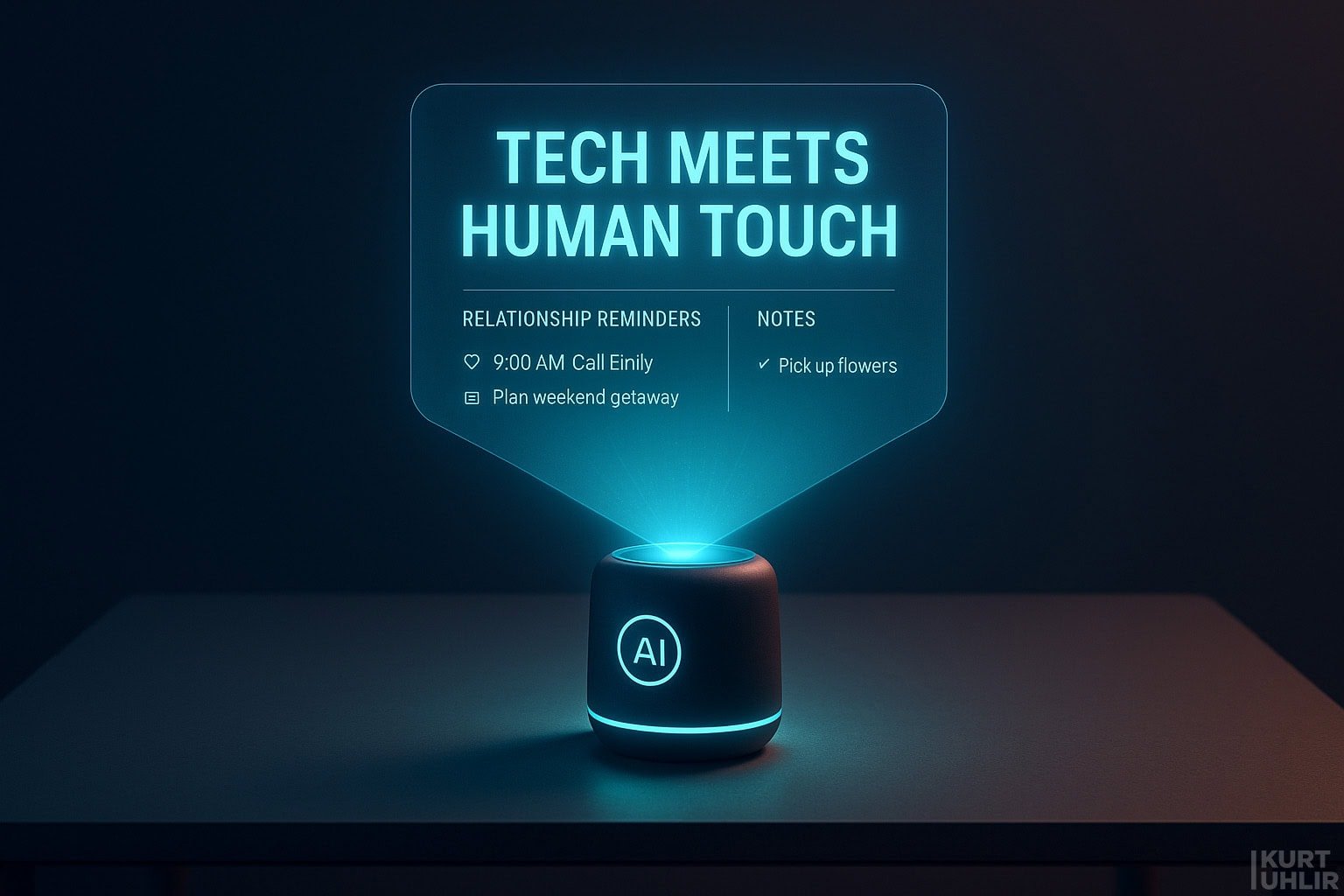
Personal CRM tools are evolving rapidly, and their rise is part of a broader shift in how we approach networking and career management.
Looking ahead, a few trends stand out – and all of them point to one thing: those who blend technology with genuine personal attention will have a massive advantage in building relationships.
AI and Automation (Don’t Worry – It Won’t Replace the Human)
Many personal CRMs are starting to integrate artificial intelligence. We’re already seeing AI that can draft outreach messages, analyze your network to suggest who you should meet, or summarize a contact’s digital footprint for quick briefing.
For example, Clay’s AI might give you a one-paragraph cheat sheet on someone based on their online presence, or Covve’s AI alerts you to news about a contact’s company.
In the near future, your personal CRM might proactively say, “Hey, you haven’t caught up with your mentor in a while, and I noticed it’s her birthday next week. Here’s a draft email wishing her a happy birthday and asking about her recent project.”
This is convenient, but here’s the key: everyone else will have AI too. Mass automation means generic messages will become ultra common – and people can smell them a mile away.
We’ve already all received those bland, mail-merged LinkedIn messages that say “Hi [Name], I see you’re in [industry]. I’d love to connect and learn about your work at [Company].” Ugh. As AI usage increases, the volume of impersonal outreach will skyrocket.
That means authentic, personalized communication will stand out more than ever.
Adopting a personal CRM now helps you ride this wave the right way. Instead of using AI to carpet-bomb contacts, you’re using it to augment your memory and thoughtfulness.
The personal CRM ensures your outreach is specific and genuine (“How’s your daughter liking her first year at Stanford?” – only something you with a relationship would know, not a random spammer).
Ironically, the more high-tech networking becomes, the more a simple, human, remembered detail will differentiate you. In a sea of AI-generated birthday emails, the person who recalls why that birthday is special (e.g., “I remember this is your first birthday as a new mom – hope you get some time to relax!”) will shine.
A personal CRM armed with your personal notes is like a cheat code for this kind of sincere messaging.
Deeper Integrations – Your Network at Your Fingertips
We can expect personal CRMs to integrate with more of our daily tools. Some are already syncing with communication platforms (WhatsApp, SMS, Slack).
Imagine in a year or two, your personal CRM could pop up context on your smartwatch before a meeting (“You last met Jim 6 months ago, he had just come back from Japan”).
Or it could sync with your car’s voice assistant so during your drive it reminds you who to call that day. My brother-n-law does this by nature. He has a short list of people he wants to stay in touch with, and he calls them from when he driving. I love that intentionality. You’ll soon have an app that can remind you too.
As these tools become ubiquitous, the friction to use them will approach zero. Networking tasks will seamlessly blend into daily routines.
Early adopters (that’s you, if you start now) will be ahead of the curve in leveraging these capabilities.
The Rise of the “Personal Chief of Staff” Concept
There’s a trend, especially among executives and entrepreneurs, to have a personal chief of staff or a dedicated person/system to manage relationships.
For most of us, hiring a human chief of staff isn’t feasible – but a personal CRM is a democratizing force here. It basically acts as a personal relationship assistant.
Looking forward, we might see more people treat managing their network with the same discipline as managing projects or finances.
In fact, career advisors are increasingly telling professionals to create a “network maintenance plan” – essentially the exact use case of a personal CRM.
It’s quite possible that in a few years, including a line on your resume or LinkedIn like “Actively maintain a personal CRM of ~500 professional contacts” will be seen as a mark of someone who “gets it” in terms of networking. It signals you value and cultivate relationships systematically (a trait any business would love in a hire).

Community and CRM Combine
Another future development is personal CRMs blending with community platforms.
We might see features where your contacts who also use a certain CRM app could opt-in to share updates or requests in a community feed.
For example, someone in your network could broadcast “Looking for a referral to Company X” and your CRM would flag that to you. This shifts networking from solely one-to-one to a hybrid of one-to-one and one-to-many (in curated ways).
We’re already seeing professional communities form (on Slack groups, LinkedIn, etc.), and personal CRMs could become the bridge between private notes and community knowledge.
The benefit for you: more opportunities to help and be helped, surfaced intelligently.
Your Goals => Your Outcomes
Bringing it back to the present – what does all this mean for you right now? It means that adopting a personal CRM and the practices we discussed isn’t just a nice experiment; it’s likely going to become the norm among savvy professionals.
We’re heading into an era where relationship capital is recognized as crucial, and tools to manage it are mainstream.
By getting a head start, you’re not only reaping immediate rewards (more organized outreach, rekindled connections, etc.), you’re also future-proofing your career. You’re positioning yourself as someone who treats networking with the strategic importance it deserves.
And critically, you’re leveraging technology to be more human, not less.
While others send out bland automated invites, you’ll be the person who sends the thoughtful, tailored note. While others rely on memory (and fail, because humans forget – finger pointed at me on that one), you’ll quietly check your app and then make a call that feels wonderfully spontaneous to the other party (“Oh wow, you remembered I got a new puppy!”).
The paradox of the future is that tech will be everywhere, so genuine human connection will be the scarce, precious commodity. A personal CRM, especially as it evolves with AI, is your assistive tech to keep that human touch alive and well.
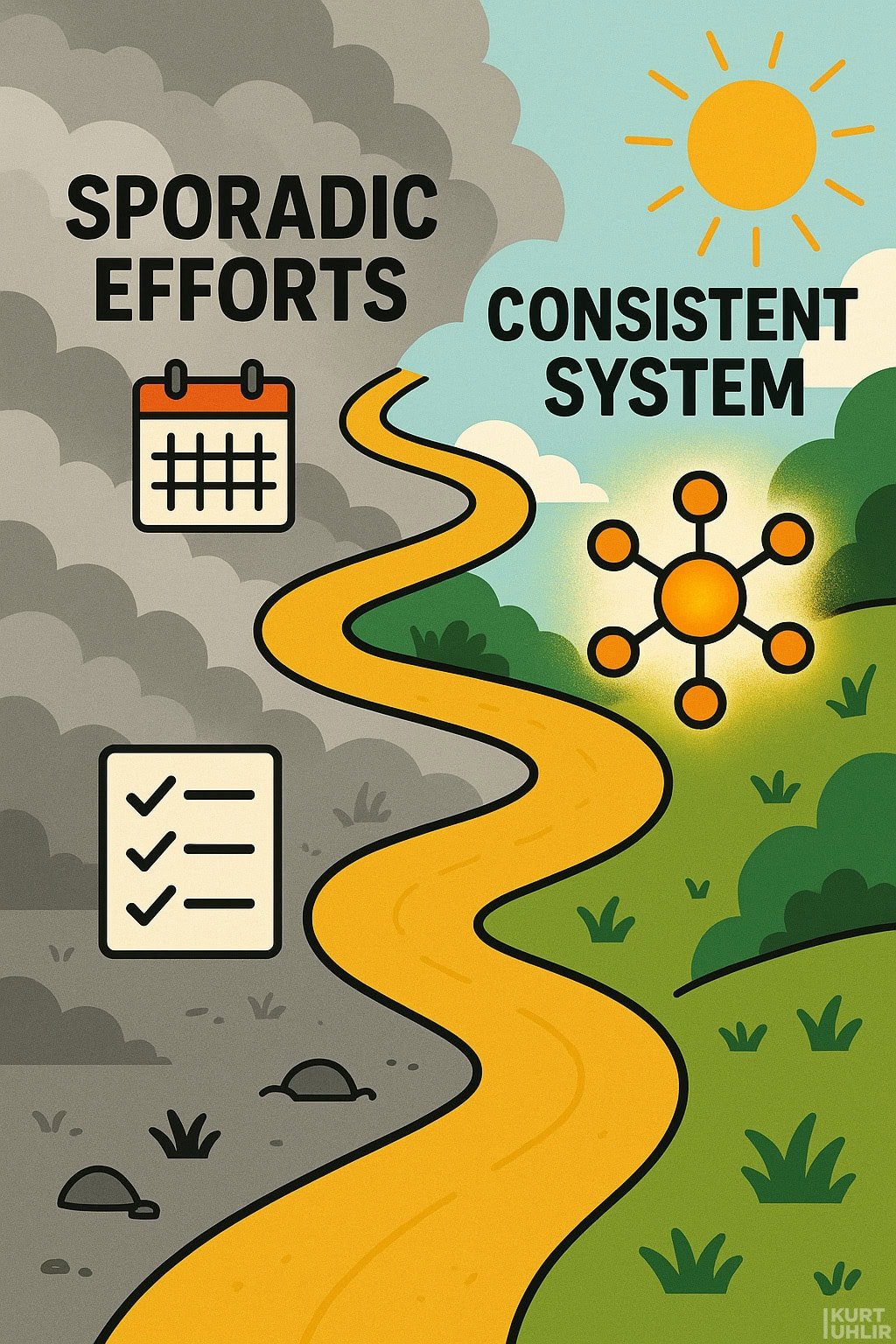
Looking for Your Next Role? Use Your CRM Differently.
If you’re actively searching for a new opportunity—especially at the executive level—you’ll want to be even more intentional with your personal CRM use. This is the time to double down on relationships, but also to add some structure around the hiring pipeline itself.
A few quick suggestions:
- Keep using your personal CRM. It’s still the best tool to maintain your long-term network. Staying top-of-mind often leads to unposted opportunities and warm referrals.
- Spin up a separate system for active opportunities. A spreadsheet or lightweight sales CRM like HubSpot (free) can help track company outreach, interviews, and follow-ups. If you’re working with an executive coach, they may have strong guidance for what they’ve seen work and what would provide them insight to shorten the time to your next role.
- Think like a dealmaker. Each conversation is a relationship first—but it may also lead to a job, referral, or partnership. Track it accordingly.
- Use reminders wisely. Stay consistent in reaching out to your top 25 contacts during the search. Your personal CRM can ensure no one falls through the cracks.
- Surround yourself with peers. Whether it’s an accountability partner, a virtual roundtable, or a structured community (like Pat Romboletti’s), the job search can be isolating. Build connection into your weekly routine.
“When executives approach job searching with the same rigor they bring to running a business—tracking conversations, follow-ups, and next steps—they stand out immediately. Your network becomes your deal flow. The ones who win don’t leave it to chance—they systematize how they show up.” —Huff Logue, Executive Coach and Founding Partner at ExecuLinks
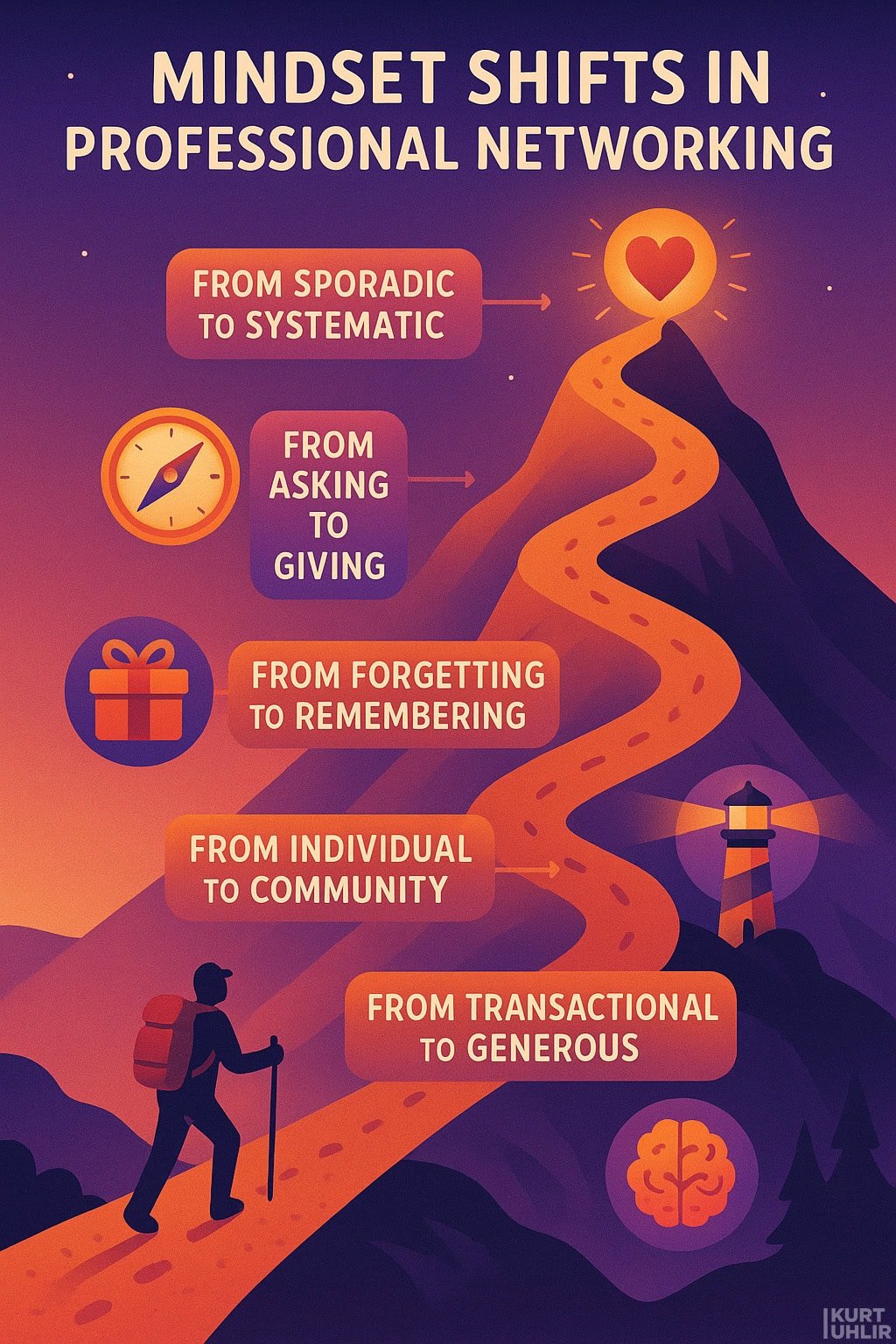
Your Next Steps: Build Your System, Build Your Future
We’ve covered a lot: from why networking matters (85%+ of jobs, folks!), to what a personal CRM is, how to choose one, how to use it effectively, and even philosophical angles like netweaving and servant leadership.
The common thread through it all is this: Relationships are the real currency of professional success, and like any valuable asset, they must be intentionally managed and nurtured.
Without a system, even the best of intentions often falter. We forget, we get busy, and suddenly that former coworker we liked hasn’t heard from us in two years. With a personal CRM and the habits described here, you create a safety net against that slippage. You’ll consistently be touching base, offering help, remembering details – in short, showing up for people. And when you show up for people, opportunities show up for you.
A personal CRM is not about being fake or manipulating relationships. It’s about being the most considerate, reliable version of yourself. It helps you keep the promises you’ve made to yourself (“I’ll stay in touch with my network regularly”) and to others (“I’ll introduce you to so-and-so” or “I’ll check back in summer to see how that project went”). It ensures that as your network grows, it retains the warmth and personal touch of when it was small.
Before we sign off, a personal note from me: Keeping your network current and staying connected has been key to both advancing my career and being a trusted resource to those I know. I’ve been able to help many more. I’ve learned that we often fall to the level of the systems we have in place. For years, I struggled with sporadic networking – reaching out only when I needed something, which is exactly what I advised against above! Adopting a personal CRM been an inflection point for me. It became part of my weekly routine, and gradually, I found myself enjoying networking more because it was about authentic relationships, not last-minute favors.
I also discovered that I needed community support to keep the momentum. In my case, I’m a regular attendee of an executive roundtable that meets virtually every week – this group, along with my personal CRM, are the pillars of my system for adding value to those I know on a regular basis. I’ll admit it’s still difficult at times to balance it all, which is why having a community and a system is crucial.
If you feel you need a community yourself, let me make a couple of suggestions:
- If you’re an individual contributor or mid-level manager aiming to level up, I highly recommend Pat Romboletti’s Bulletproof Your Career community. It provides a “paint by numbers” approach to land your next role and, importantly, a network of like-minded people who will keep you motivated and accountable in your journey. (Full disclosure: I’ve recommended Pat’s community to dozens of people at all levels and have seen firsthand the impact of her program.)
- Now, if you’re a senior executive looking for a peer group, reach out to me directly. I’m happy to introduce you to the virtual executive roundtable that I’m part of, or to help you find one that fits your needs. Surrounding yourself with a community, while also leveraging tools like personal CRM, creates an ecosystem of growth and support. You don’t have to do this alone.
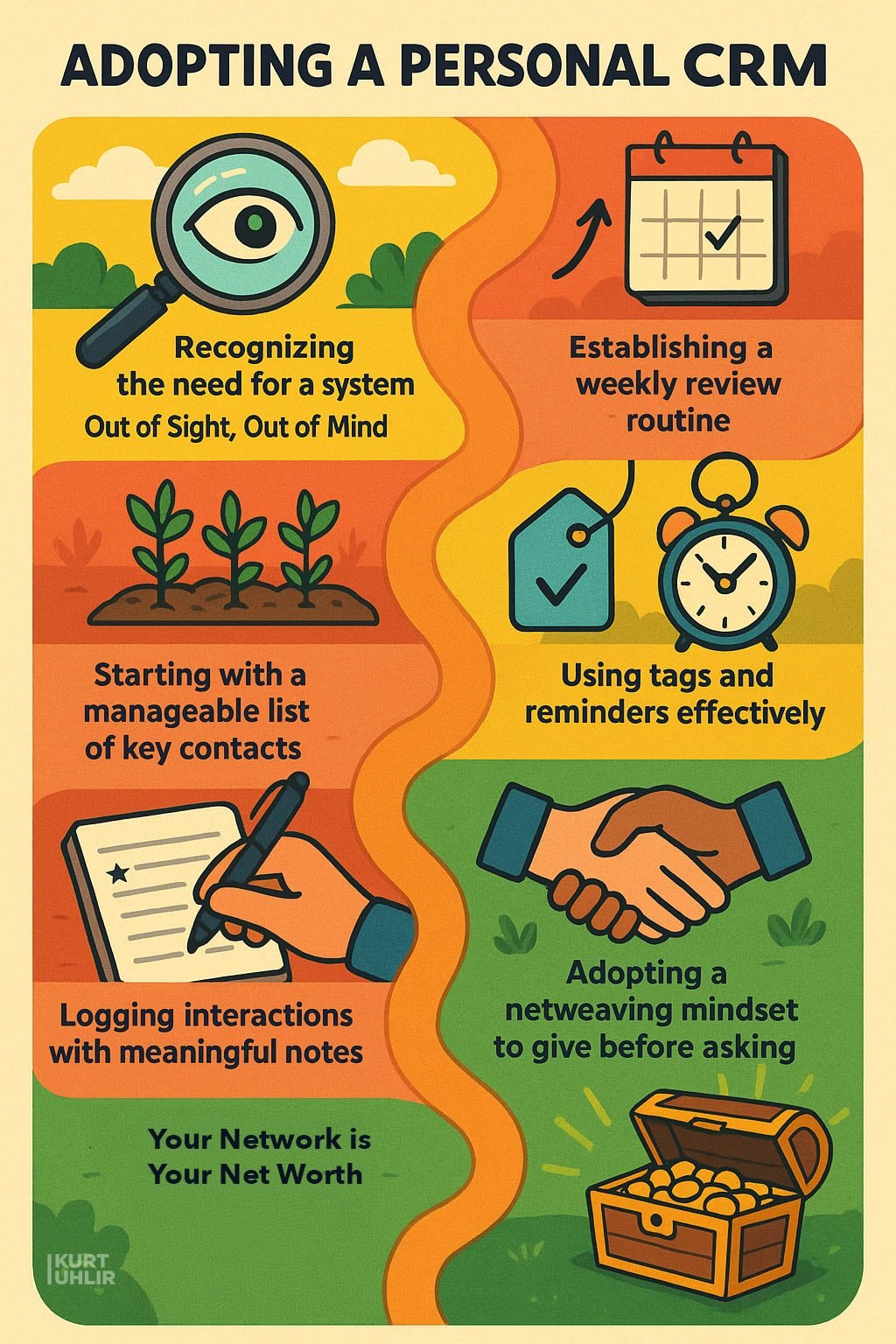
In closing, the proactive management of relationships might feel like extra work, but it’s the kind of work that truly pays off.
And, with the right tools, you can do it in 15 to 60 minutes per week. Imagine not having to start from scratch when looking for your next role? Imagine if your contacts came to you when they needed help or had an opportunity?
Doors open that you never knew existed. “Luck” in careers often boils down to people – someone thinking of you for an opportunity because you stayed on their radar in a friendly way. By implementing a personal CRM system, you are tilting the odds in your favor, day by day, interaction by interaction.
So here’s your nudge: give it a try. You don’t need to get it perfect. Maybe start by adding 10 people and setting a few reminders. See how it feels after a month. Did you reconnect with someone and have a great conversation? Did you learn something new or help someone out? I bet you will have at least one “I’m so glad I reached out” moment. Treasure that. It’s evidence that this is working – that you’re investing in one of the most fulfilling parts of life: our connections with others.
Your network truly can be your net worth, but only if you nurture it.
A personal CRM is your tool to cultivate that garden of relationships, with minimal effort, so it keeps rewarding you with opportunities, knowledge, friendship, and support.
In a world increasingly driven by automation and impersonal communication, you now have the blueprint to harness technology in a way that enhances personal touch. That is a superpower. Use it well, and you’ll not only advance your own career, but you’ll bring others along with you – which, in the end, is the greatest success of all.
Go forth and never lose touch!
Additional reading on the topics of personal CRMs:
- Personal CRMs & Netweaving: Networking as a “Pay It Forward” Practice
- Personal CRMs & Servant Leadership: Leading by Putting People First

